Core Set 2021 and Jumpstart Release Notes
Compiled by Eli Shiffrin, with contributions from Laurie Cheers, Tom Fowler, Carsten Haese, Nathan Long, and Thijs van Ommen
Document last modified June 15, 2020
DOC Download Links:
English | 中國話,漢語;中文 | 中国话,汉语;中文 | Français | Deutsch
Italiano | 日本語 | 한글 | Português | русский язык | Español
The Release Notes include information concerning the release of a new Magic: The Gathering set, as well as a collection of clarifications and rulings involving that set's cards. It's intended to make playing with the new cards more fun by clearing up the common misconceptions and confusion inevitably caused by new mechanics and interactions. As future sets are released, updates to the Magic rules may cause some of this information to become outdated. Go to Magic.Wizards.com/Rules to find the most up-to-date rules.
The "General Notes" section includes release information and explains the mechanics and concepts in the set.
The "Card-Specific Notes" sections contains answers to the most important, most common, and most confusing questions players might ask about cards in the set. Items in the "Card-Specific Notes" sections include full card text for your reference. Not all cards in the set are listed.
GENERAL NOTES
Release Information
Core Set 2021 becomes legal for sanctioned Constructed play on its official release date: Friday, July 3, 2020. At that time, the following card sets will be permitted in the Standard format: Guilds of Ravnica, Ravnica Allegiance, War of the Spark, Core Set 2020, Throne of Eldraine, Theros Beyond Death, Ikoria: Lair of Behemoths, and Core Set 2021.
Cards printed in Core Set 2021 draft boosters, Core Set 2021 Planeswalker Decks, and the Core Set 2021 Buy-a-Box promo card will be included in the Standard format.
There are thirty-seven new cards (with printed set code JMP and collector numbers 1–37) printed in Jumpstart packs. These cards are legal for play in the Commander, Vintage, and Legacy formats. They aren't legal for play in the Standard, Pioneer, or Modern formats. The other cards in these packs (printed set code JMP, collector numbers 38–495; and some with printed set code M21) are legal for play in any format that already allows those cards. That is, appearing in these packs doesn't change a card's legality in any format.
Go to Magic.Wizards.com/Formats for a complete list of formats and their permitted card sets and banned lists.
Go to Locator.Wizards.com to find an event or store near you.
New Keyword Action: Mill
Players have been putting the top card of their library into their graveyard since the Antiquities set, and that's quite a lot of words to say to describe the action. Players have called this "mill," named after the card Millstone, and this term has now been promoted to an official game term.
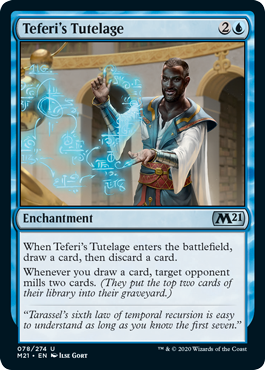
Teferi's Tutelage
{2}{U}
Enchantment
When Teferi's Tutelage enters the battlefield, draw a card, then discard a card.
Whenever you draw a card, target opponent mills two cards. (They put the top two cards of their library into their graveyard.)
- If a player is instructed to mill more cards than they have in their library, they put all of the cards in their library into their graveyard. On the other hand, if a player is given a choice to mill more cards than they have in their library, they can't choose to do so.
- Once a player's library is empty, that player doesn't lose the game until they try to draw a card and can't.
New Creature Type: Dog
Core Set 2021 has gone to the dogs in the best way possible! Not only does the set itself contain more canines than you can shake a stick at, all existing Hounds have received errata to be Dogs instead.
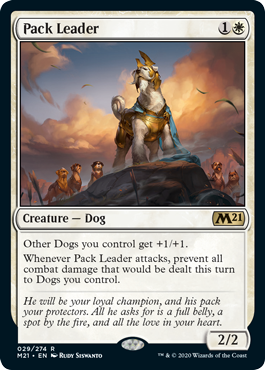
Pack Leader
{1}{W}
Creature — Dog
2/2
Other Dogs you control get +1/+1.
Whenever Pack Leader attacks, prevent all combat damage that would be dealt this turn to Dogs you control.
- Each Hound creature card has received errata to replace that subtype with Dog. Those cards keep their other subtypes. Similarly, cards that become Hounds or create Hound tokens have received errata to replace that one word with Dog. No other cards have received errata to become Dogs.
Returning Keyword Ability: Prowess
Casting noncreature spells inspires certain creatures to feats of martial glory. These creatures with the returning prowess keyword get +1/+1 for the turn whenever you cast a noncreature spell.
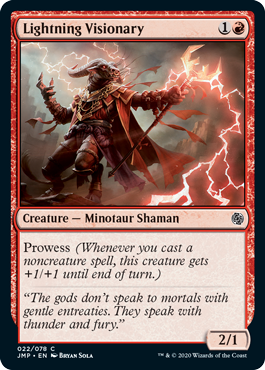
Lightning Visionary
{1}{R}
Creature — Minotaur Shaman
2/1
Prowess (Whenever you cast a noncreature spell, this creature gets +1/+1 until end of turn.)
- Any spell you cast that doesn't have the type creature will cause prowess to trigger. Playing a land also won't cause prowess to trigger.
- An ability that triggers when a player casts a spell resolves before the spell that caused it to trigger. It resolves even if that spell is countered.
Card Cycle: Shrine Enchantments
Core Set 2021 features six legendary Shrines. Shrine is an enchantment type that has no inherent rules meaning, but each Shrine gets better and better as you control more and more Shrines.
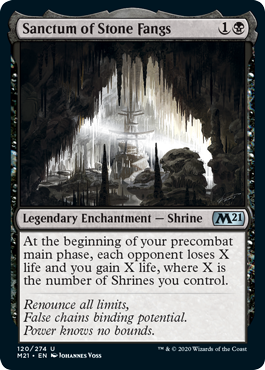
Sanctum of Stone Fangs
{1}{B}
Legendary Enchantment — Shrine
At the beginning of your precombat main phase, each opponent loses X life and you gain X life, where X is the number of Shrines you control.
- Each Shrine has an ability that counts the number of Shrines you control. These abilities include the Shrine they're printed on.
- Shrines count only enchantments with the subtype Shrine. Other cards with "shrine" in their name (such as Jungle Shrine, Luxa River Shrine, and Nantuko Shrine) don't count.
CORE SET 2021 CARD-SPECIFIC NOTES
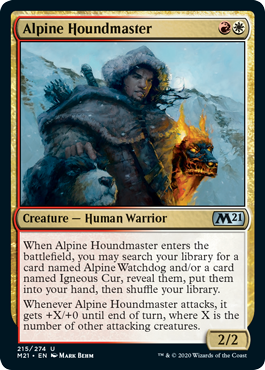
Alpine Houndmaster
{R}{W}
Creature — Human Warrior
2/2
When Alpine Houndmaster enters the battlefield, you may search your library for a card named Alpine Watchdog and/or a card named Igneous Cur, reveal them, put them into your hand, then shuffle your library.
Whenever Alpine Houndmaster attacks, it gets +X/+0 until end of turn, where X is the number of other attacking creatures.
- The value of X is determined only as Alpine Houndmaster's last ability resolves. Once that happens, the value of X won't change later in the turn even if the number of attacking creatures changes.
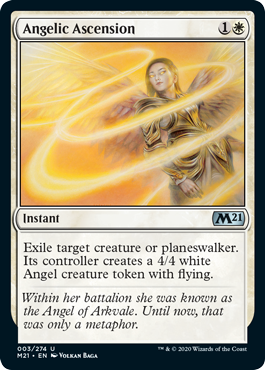
Angelic Ascension
{1}{W}
Instant
Exile target creature or planeswalker. Its controller creates a 4/4 white Angel creature token with flying.
- If the target permanent is an illegal target by the time Angelic Ascension tries to resolve, the spell won't resolve. No player will create an Angel token.
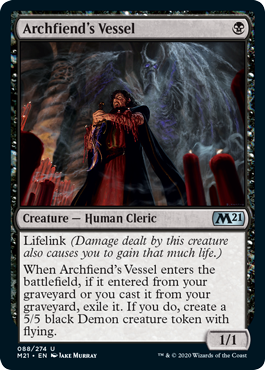
Archfiend's Vessel
{B}
Creature — Human Cleric
1/1
Lifelink (Damage dealt by this creature also causes you to gain that much life.)
When Archfiend's Vessel enters the battlefield, if it entered from your graveyard or you cast it from your graveyard, exile it. If you do, create a 5/5 black Demon creature token with flying.
- If Archfiend's Vessel leaves the battlefield while its triggered ability is on the stack, you can't exile it from the zone it's put into, so you won't create a Demon.
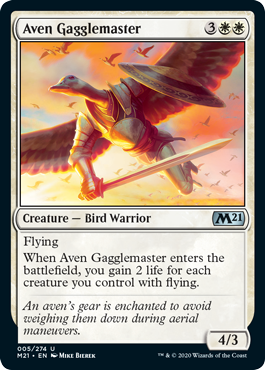
Aven Gagglemaster
{3}{W}{W}
Creature — Bird Warrior
4/3
Flying
When Aven Gagglemaster enters the battlefield, you gain 2 life for each creature you control with flying.
- The amount of life you gain is determined only as Aven Gagglemaster's triggered ability resolves. If Aven Gagglemaster is still on the battlefield at that time, it will be counted by its own ability.
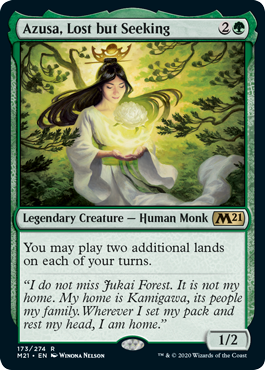
Azusa, Lost but Seeking
{2}{G}
Legendary Creature — Human Monk
1/2
You may play two additional lands on each of your turns.
- Azusa's ability is cumulative with other effects that allow you to play additional lands, such as that of Song of Creation (from the Ikoria: Lair of Behemoths set).
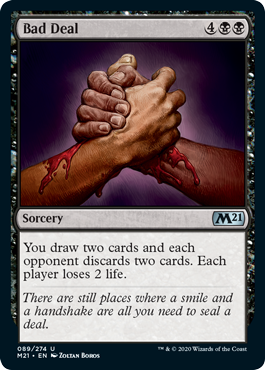
Bad Deal
{4}{B}{B}
Sorcery
You draw two cards and each opponent discards two cards. Each player loses 2 life.
- You draw just two cards no matter how many opponents you have.
- If an opponent has just one card in hand, that player discards just one card. Other opponents still discard two if able.
- Each player loses 2 life, including you, regardless of how many cards they draw or discard.
- As Bad Deal resolves, first you draw two cards. Then the next opponent in turn order (or, if it's an opponent's turn, the opponent whose turn it is) chooses two cards in hand without revealing them, then each other opponent in turn order does the same. All the chosen cards are discarded at the same time. Then each player loses 2 life.
- In a Two-Headed Giant game, Bad Deal causes each team to lose 4 life. Your teammate doesn't draw or discard any cards.
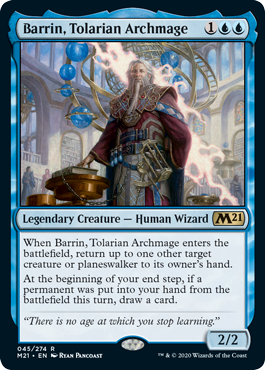
Barrin, Tolarian Archmage
{1}{U}{U}
Legendary Creature — Human Wizard
2/2
When Barrin, Tolarian Archmage enters the battlefield, return up to one other target creature or planeswalker to its owner's hand.
At the beginning of your end step, if a permanent was put into your hand from the battlefield this turn, draw a card.
- You draw only one card, no matter how many permanents were put into your hand from the battlefield during that turn.
- The permanent that was returned to your hand doesn't have to still be there.
- If a token is returned to your hand, it's put there before it ceases to exist.
- Barrin's last ability checks the entire turn, even before Barrin was on the battlefield.
- If a permanent wasn't put into your hand from the battlefield before your end step begins, Barrin's ability doesn't trigger at all.
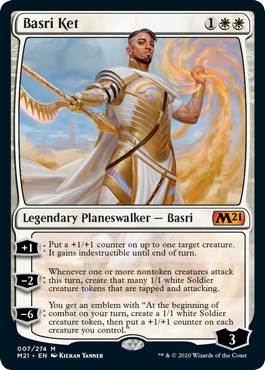
Basri Ket
{1}{W}{W}
Legendary Planeswalker — Basri
3
+1: Put a +1/+1 counter on up to one target creature. It gains indestructible until end of turn.
−2: Whenever one or more nontoken creatures attack this turn, create that many 1/1 white Soldier creature tokens that are tapped and attacking.
−6: You get an emblem with "At the beginning of combat on your turn, create a 1/1 white Soldier creature token, then put a +1/+1 counter on each creature you control."
- The delayed triggered ability of Basri's second ability triggers if any nontoken creatures attack, and it counts how many nontoken creatures attacked. Attacking nontoken creatures that leave combat before the triggered ability resolves are counted. Token creatures that are attacking don't stop the ability from triggering and aren't counted.
- You choose which player or planeswalker each Soldier token is attacking. They don't have to be attacking the same players or planeswalkers that the nontoken creatures are attacking, and they don't have to be attacking the same player or planeswalker as each other.
- Although the Soldiers are attacking creatures, they were never declared as attacking creatures. This means that abilities that trigger whenever a creature attacks won't trigger when the Soldiers enter the battlefield attacking.
- Any effects that say that the Soldiers can't attack (such as that of Propaganda) affect only the declaration of attackers. They won't stop the Soldier tokens from entering the battlefield attacking.
- The Soldier token created by Basri's last ability can't attack during the turn you create it unless it gains haste somehow.
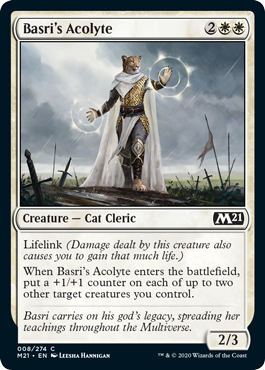
Basri's Acolyte
{2}{W}{W}
Creature — Cat Cleric
2/3
Lifelink (Damage dealt by this creature also causes you to gain that much life.)
When Basri's Acolyte enters the battlefield, put a +1/+1 counter on each of up to two other target creatures you control.
- You can't target the same creature twice with the triggered ability of Basri's Acolyte to give it two +1/+1 counters.
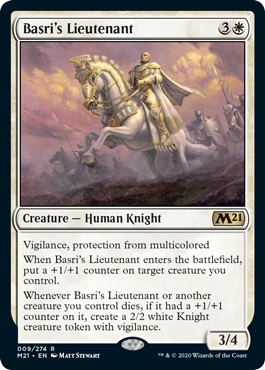
Basri's Lieutenant
{3}{W}
Creature — Human Knight
3/4
Vigilance, protection from multicolored
When Basri's Lieutenant enters the battlefield, put a +1/+1 counter on target creature you control.
Whenever Basri's Lieutenant or another creature you control dies, if it had a +1/+1 counter on it, create a 2/2 white Knight creature token with vigilance.
- Basri's Lieutenant can be the target of its own enters-the-battlefield triggered ability.
- The second triggered ability of Basri's Lieutenant triggers just once if the dying creature has +1/+1 counters on it, no matter how many of those counters it has.
- If Basri's Lieutenant dies at the same time as other creatures, its last ability will trigger for any of the creatures that had a +1/+1 counter on it, including itself.
- If a creature with +1/+1 counters on it receives a greater or equal number of -1/-1 counters and this causes it to be destroyed by lethal damage or put into its owner's graveyard for having 0 or less toughness, the last ability triggers. This is because the ability checks the creature as it last existed on the battlefield, and it still had those counters on it at that point.
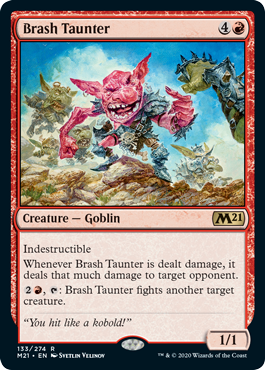
Brash Taunter
{4}{R}
Creature — Goblin
1/1
Indestructible
Whenever Brash Taunter is dealt damage, it deals that much damage to target opponent.
{2}{R}, {T}: Brash Taunter fights another target creature.
- A creature can be dealt an amount of damage greater than its toughness. For example, if Brash Taunter is dealt 3 damage, its middle ability deals 3 damage, not 1, to the target opponent.
- If your life total is brought to 0 or less at the same time that Brash Taunter is dealt damage, you lose the game before its middle ability goes on the stack.
- If the target creature is an illegal target when Brash Taunter's last ability tries to resolve, the ability doesn't resolve. If Brash Taunter is no longer on the battlefield, the target creature won't deal or be dealt damage.
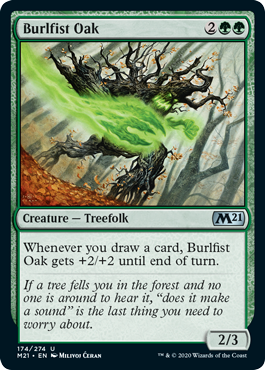
Burlfist Oak
{2}{G}{G}
Creature — Treefolk
2/3
Whenever you draw a card, Burlfist Oak gets +2/+2 until end of turn.
- If a spell or ability causes a player to put a card into their hand without specifically using the word "draw," it's not a card drawn.
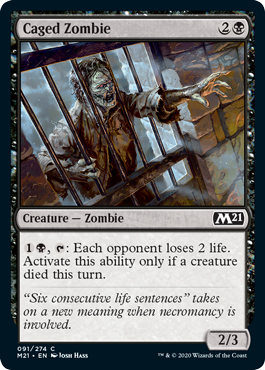
Caged Zombie
{2}{B}
Creature — Zombie
2/3
{1}{B}, {T}: Each opponent loses 2 life. Activate this ability only if a creature died this turn.
- In a Two-Headed Giant game, Caged Zombie's ability causes the opposing team to lose 4 life.
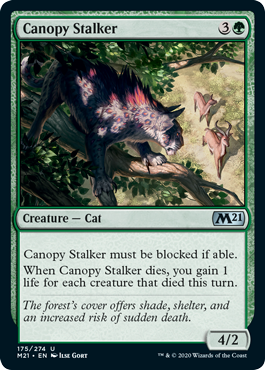
Canopy Stalker
{3}{G}
Creature — Cat
4/2
Canopy Stalker must be blocked if able.
When Canopy Stalker dies, you gain 1 life for each creature that died this turn.
- Only one creature is required to block Canopy Stalker. Other creatures may also block it, and are free to block other creatures or not block at all.
- The defending player, not you, chooses which creature blocks Canopy Stalker.
- If each creature the defending player controls can't block for any reason (such as being tapped), then Canopy Stalker isn't blocked. If there's a cost associated with blocking Canopy Stalker, the defending player isn't forced to pay that cost, so it doesn't have to be blocked in that case either.
- Canopy Stalker's triggered ability counts itself, as well as any other creatures that die before the triggered ability resolves.
- If your life total is brought to 0 or less at the same time that Canopy Stalker is dealt lethal damage, you lose the game before its last ability goes on the stack.
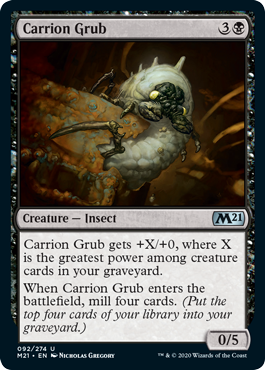
Carrion Grub
{3}{B}
Creature — Insect
0/5
Carrion Grub gets +X/+0, where X is the greatest power among creature cards in your graveyard.
When Carrion Grub enters the battlefield, mill four cards. (Put the top four cards of your library into your graveyard.)
- Carrion Grub's first ability applies only while it is on the battlefield. In all other zones, its power is 0.
- Any counters on creatures that die or effects that affect them until end of turn won't apply to those cards in their owner's graveyard.
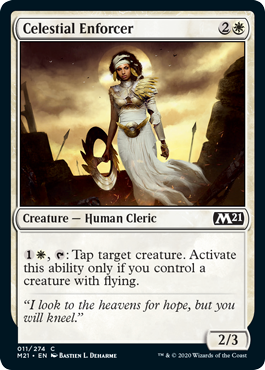
Celestial Enforcer
{2}{W}
Creature — Human Cleric
2/3
{1}{W}, {T}: Tap target creature. Activate this ability only if you control a creature with flying.
- Once you begin activating Celestial Enforcer's ability, players can't take any other actions until you're done activating it. Notably, they can't try to remove your creatures with flying to make it illegal to activate the ability.
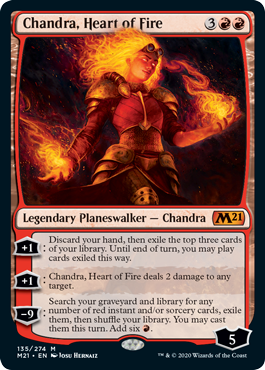
Chandra, Heart of Fire
{3}{R}{R}
Legendary Planeswalker — Chandra
5
+1: Discard your hand, then exile the top three cards of your library. Until end of turn, you may play cards exiled this way.
+1: Chandra, Heart of Fire deals 2 damage to any target.
−9: Search your graveyard and library for any number of red instant and/or sorcery cards, exile them, then shuffle your library. You may cast them this turn. Add six {R}.
- If you have no cards in hand, you still exile three cards while resolving Chandra's first ability and you may play them this turn.
- You must follow the normal timing permissions and restrictions for the exiled cards for Chandra's first and last abilities. If one is a land, you can't play it unless you have land plays available.
- You'll still pay all costs for a spell cast this way, including additional costs. You may also pay alternative costs if any are available.
- If you don't play the exiled cards, they remain exiled.
- Because it's a loyalty ability, Chandra's last ability isn't a mana ability. It can be activated only any time you could cast a sorcery. It uses the stack and can be responded to.
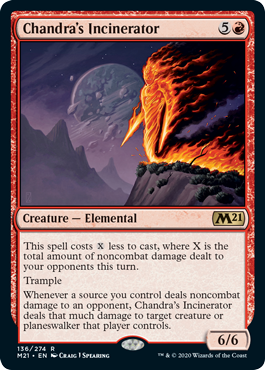
Chandra's Incinerator
{5}{R}
Creature — Elemental
6/6
This spell costs {X} less to cast, where X is the total amount of noncombat damage dealt to your opponents this turn.
Trample
Whenever a source you control deals noncombat damage to an opponent, Chandra's Incinerator deals that much damage to target creature or planeswalker that player controls.
- Combat damage is the damage that's dealt automatically by attacking and blocking creatures. Any other damage is noncombat damage, even if it's dealt during a combat phase by an attacking or blocking creature.
- Chandra's Incinerator counts all noncombat damage dealt to your opponents, not the difference in their life totals since the turn began. For example, if an opponent was dealt 5 noncombat damage but gained 3 life, Chandra's Incinerator still costs just {R}.
- The cost reduction applies only to generic mana in the cost of Chandra's Incinerator. It can't reduce the {R} requirement.
- In a multiplayer game, Chandra's Incinerator counts damage dealt to opponents who have lost the game.
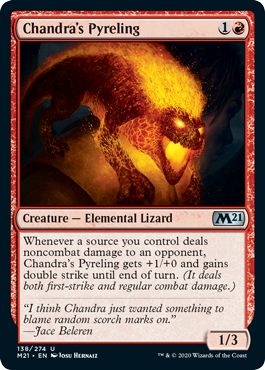
Chandra's Pyreling
{1}{R}
Creature — Elemental Lizard
1/3
Whenever a source you control deals noncombat damage to an opponent, Chandra's Pyreling gets +1/+0 and gains double strike until end of turn. (It deals both first-strike and regular combat damage.)
- Combat damage is the damage that's dealt automatically by attacking and blocking creatures. Any other damage is noncombat damage, even if it's dealt during a combat phase by an attacking or blocking creature.
- The ability of Chandra's Pyreling triggers just once per event for each opponent who is dealt noncombat damage by a source you control, regardless of how much damage that player is dealt. For example, if a sorcery you control deals 2 damage to each opponent in a four-player game, the ability will trigger three times.
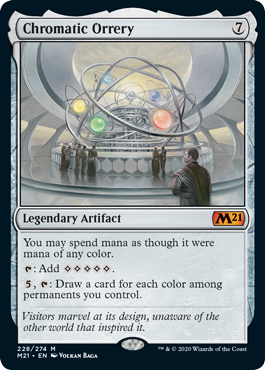
Chromatic Orrery
{7}
Legendary Artifact
You may spend mana as though it were mana of any color.
{T}: Add {C}{C}{C}{C}{C}.
{5}, {T}: Draw a card for each color among permanents you control.
- Chromatic Orrery's last ability can have you draw at most five cards. "Colorless," "artifact," and "gold" are not colors.
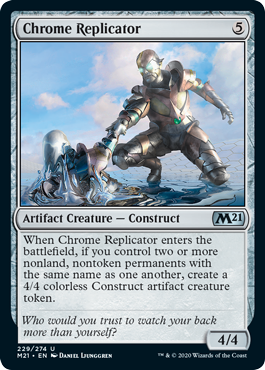
Chrome Replicator
{5}
Artifact Creature — Construct
4/4
When Chrome Replicator enters the battlefield, if you control two or more nonland, nontoken permanents with the same name as one another, create a 4/4 colorless Construct artifact creature token.
- If you don't control two nonland, nontoken permanents with the same name immediately after Chrome Replicator enters the battlefield, its ability doesn't trigger. If you don't control two as the ability resolves, you don't create a token. They don't have to be the same pair, however.
- Chrome Replicator's ability creates just one Construct, no matter how many namesake pairs of permanents you control.
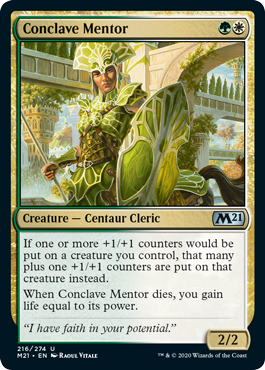
Conclave Mentor
{G}{W}
Creature — Centaur Cleric
2/2
If one or more +1/+1 counters would be put on a creature you control, that many plus one +1/+1 counters are put on that creature instead.
When Conclave Mentor dies, you gain life equal to its power.
- If a creature you control would enter the battlefield with a number of +1/+1 counters on it, it enters with that many plus one instead.
- Conclave Mentor's first ability doesn't apply to itself if it's somehow entering the battlefield with a +1/+1 counter on it.
- If you control two Conclave Mentors, the number of +1/+1 counters put on a creature is two plus the original number. Three Conclave Mentors add three, and so on.
- If two or more effects attempt to modify how many counters would be put onto a creature you control, you choose the order to apply those effects, no matter who controls the sources of those effects.
- Use Conclave Mentor's power as it last existed on the battlefield to determine how much life you gain.
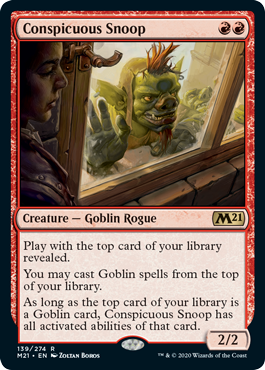
Conspicuous Snoop
{R}{R}
Creature — Goblin Rogue
2/2
Play with the top card of your library revealed.
You may cast Goblin spells from the top of your library.
As long as the top card of your library is a Goblin card, Conspicuous Snoop has all activated abilities of that card.
- If the top card of your library changes while you're casting a spell, playing a land, or activating an ability, you don't reveal the new top card until you finish doing so. This means that if you cast the top card of your library, you can't look at the next one until you're done paying for that spell. While the top card isn't revealed, Conspicuous Snoop doesn't have any abilities of that card.
- You must follow the normal timing permissions and restrictions of the Goblin spells you cast from your library.
- You still pay all costs for a Goblin spell you cast from your library, including additional costs. You may also pay alternative costs.
- Activated abilities contain a colon. They're generally written "[Cost]: [Effect]." Some keyword abilities are activated abilities and will have colons in their reminder text.
- If an activated ability of Goblin card on top of your library references the card it's printed on by name, treat Conspicuous Snoop's instance of that ability as though it referenced Conspicuous Snoop by name instead. For instance, if Conspicuous Snoop has Brash Taunter's ability, Conspicuous Snoop fights, not Brash Taunter.
- If Conspicuous Snoop gains a set of linked activated abilities (for example, one ability that exiles a card and another that refers to the card "exiled with" the object), that link only lasts as long as Conspicuous Snoop has those abilities. If it loses the abilities and then regains them, the link is lost.
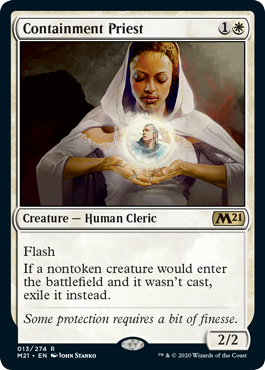
Containment Priest
{1}{W}
Creature — Human Cleric
2/2
Flash
If a nontoken creature would enter the battlefield and it wasn't cast, exile it instead.
- Containment Priest's last ability won't affect any creatures that were cast, including ones cast from unusual zones such as your graveyard.
- Containment Priest's last ability doesn't stop creature tokens from entering the battlefield. It also doesn't affect creatures that were already on the battlefield.
- If a noncreature card wasn't cast and is entering the battlefield as a creature (due to an effect such as that of March of the Machines), it will be exiled. Similarly, if a creature card wasn't cast and is entering the battlefield as a noncreature permanent (for example, Heliod, Sun-Crowned with insufficient devotion), it won't be exiled.
- If Containment Priest enters the battlefield without being cast, its ability won't exile itself.
- If Containment Priest enters the battlefield at the same time as other creatures, its ability won't affect those creatures.
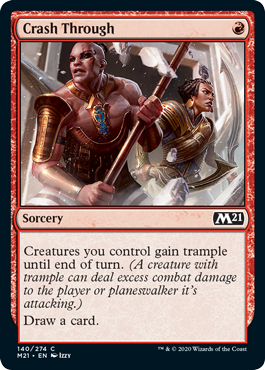
Crash Through
{R}
Sorcery
Creatures you control gain trample until end of turn. (A creature with trample can deal excess combat damage to the player or planeswalker it's attacking.)
Draw a card.
- Crash Through affects only creatures you control at the time it resolves. Creatures you begin to control later in the turn won't gain trample.
- You may cast Crash Through even if you control no creatures. If you control no creatures as the spell resolves, you'll just draw a card.
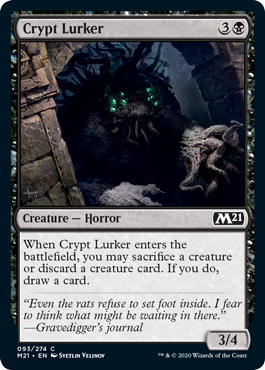
Crypt Lurker
{3}{B}
Creature — Horror
3/4
When Crypt Lurker enters the battlefield, you may sacrifice a creature or discard a creature card. If you do, draw a card.
- While resolving Crypt Lurker's ability, you can't sacrifice more than one creature, discard more than one card, or do both to draw more than one card.
- Crypt Lurker can be sacrificed to pay the cost of its own triggered ability.
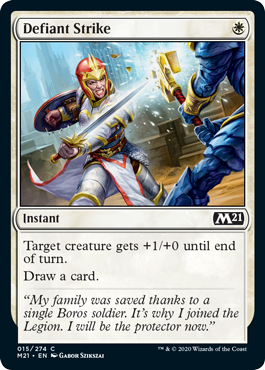
Defiant Strike
{W}
Instant
Target creature gets +1/+0 until end of turn.
Draw a card.
- If the target creature is an illegal target by the time Defiant Strike tries to resolve, the spell won't resolve. You won't draw a card.
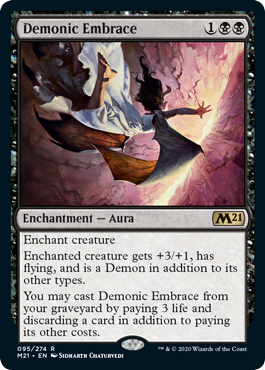
Demonic Embrace
{1}{B}{B}
Enchantment — Aura
Enchant creature
Enchanted creature gets +3/+1, has flying, and is a Demon in addition to its other types.
You may cast Demonic Embrace from your graveyard by paying 3 life and discarding a card in addition to paying its other costs.
- Casting Demonic Embrace with the permission granted by its last ability doesn't change when you can cast it.
- If another effect gives you permission to cast Demonic Embrace from your graveyard, you don't pay the additional cost imposed by its last ability if you use that permission.
- If the enchanted creature dies during your turn, you receive priority before any other player does. If you're allowed to cast Demonic Embrace at that time, you may do so before any player can attempt to remove it from your graveyard.
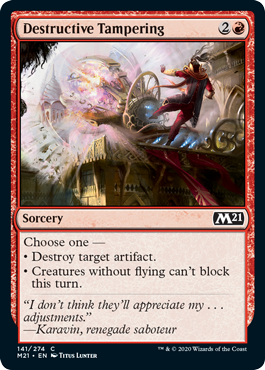
Destructive Tampering
{2}{R}
Sorcery
Choose one —
• Destroy target artifact.
• Creatures without flying can't block this turn.
- Because the effect of Destructive Tampering's second mode doesn't change the characteristics of any permanents, the set of creatures affected by it is constantly updated. Creatures without flying that enter the battlefield later in the turn won't be able to block.
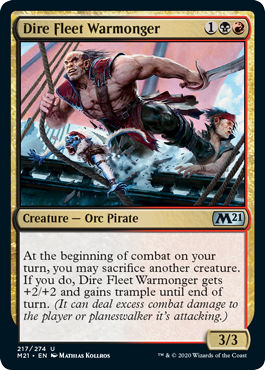
Dire Fleet Warmonger
{1}{B}{R}
Creature — Orc Pirate
3/3
At the beginning of combat on your turn, you may sacrifice another creature. If you do, Dire Fleet Warmonger gets +2/+2 and gains trample until end of turn. (It can deal excess combat damage to the player or planeswalker it's attacking.)
- While resolving Dire Fleet Warmonger's ability, you can't sacrifice multiple creatures to give it more than +2/+2 and trample.
- You choose whether to sacrifice a creature and which to sacrifice as Dire Fleet Warmonger's ability resolves. No player can take action between the time you make that choice and the time it gets +2/+2 and has trample, if appropriate.
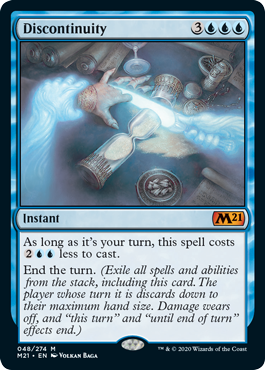
Discontinuity
{3}{U}{U}{U}
Instant
As long as it's your turn, this spell costs {2}{U}{U} less to cast.
End the turn. (Exile all spells and abilities from the stack, including this card. The player whose turn it is discards down to their maximum hand size. Damage wears off, and "this turn" and "until end of turn" effects end.)
- To determine the total cost of a spell, start with the mana cost or alternative cost you're paying, add any cost increases, then apply any cost reductions (such as that of Discontinuity). The converted mana cost of the spell remains unchanged, no matter what the total cost to cast it was.
- Ending the turn this way means the following things happen in order: 1) All spells and abilities on the stack are exiled. This includes spells and abilities that can't be countered. 2) If there are any attacking and blocking creatures, they're removed from combat. 3) State-based actions are checked. No player gets priority, and no triggered abilities are put onto the stack. 4) The current phase and/or step ends. The game skips straight to the cleanup step. 5) The cleanup step happens in its entirety.
- If any triggered abilities do trigger during this process, they're put onto the stack during the cleanup step. If this happens, players will have a chance to cast spells and activate abilities, then there will be another cleanup step before the turn is over.
- Though other spells and abilities that are exiled won't get a chance to resolve, they don't count as being countered.
- Any "at the beginning of the next end step" triggered abilities won't get the chance to trigger that turn because the end step is skipped. Those abilities will trigger at the beginning of the end step of the next turn.
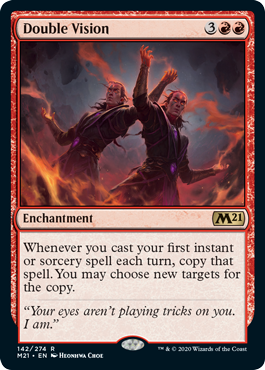
Double Vision
{3}{R}{R}
Enchantment
Whenever you cast your first instant or sorcery spell each turn, copy that spell. You may choose new targets for the copy.
- If you cast an instant or sorcery spell before Double Vision enters the battlefield during the same turn, its ability can't trigger that turn.
- Double Vision's ability will copy any instant or sorcery spell, not just one with targets.
- A copy is created even if the spell that caused Double Vision's ability to trigger has been countered by the time that ability resolves. The copy resolves before the original spell.
- The copy will have the same targets as the spell it's copying unless you choose new ones. You may change any number of the targets, including all of them or none of them. The new targets must be legal.
- If the spell that's copied is modal (that is, it says "Choose one —" or the like), the copy will have the same mode or modes. You can't choose different ones.
- If the spell that's copied has an X whose value was determined as it was cast, the copy has the same value of X.
- You can't choose to pay any additional costs for the copy. However, effects based on any additional costs that were paid for the original spell are copied as though those same costs were paid for the copy too.
- The copy that Double Vision's ability creates is created on the stack, so it's not "cast." Abilities that trigger when a player casts a spell won't trigger.
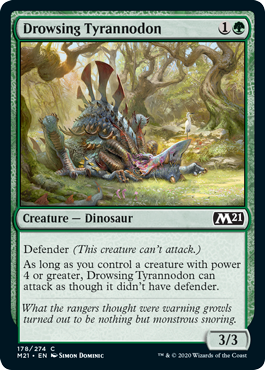
Drowsing Tyrannodon
{1}{G}
Creature — Dinosaur
3/3
Defender (This creature can't attack.)
As long as you control a creature with power 4 or greater, Drowsing Tyrannodon can attack as though it didn't have defender.
- Once Drowsing Tyrannodon has attacked, it will remain an attacking creature even if you no longer control a creature with power 4 or greater.
- If Drowsing Tyrannodon's power is raised to 4 or greater, it will allow itself to attack.
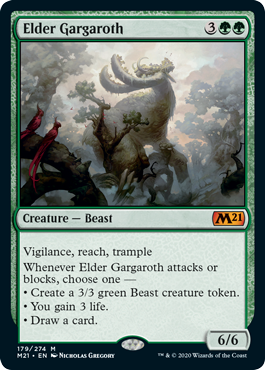
Elder Gargaroth
{3}{G}{G}
Creature — Beast
6/6
Vigilance, reach, trample
Whenever Elder Gargaroth attacks or blocks, choose one —
• Create a 3/3 green Beast creature token.
• You gain 3 life.
• Draw a card.
- If you create a Beast token, that token can't attack or block during the same combat, even if it gains haste.
- Players can cast spells after Elder Gargaroth's triggered ability has resolved but before blockers are declared (if it's attacking) or before combat damage is dealt (if it's blocking).
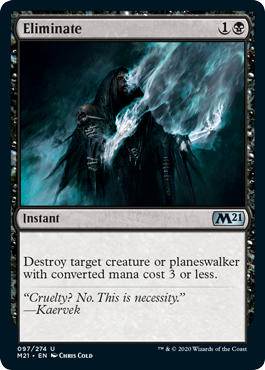
Eliminate
{1}{B}
Instant
Destroy target creature or planeswalker with converted mana cost 3 or less.
- If a creature or planeswalker on the battlefield has {X} in its mana cost, X is considered to be 0.
- The converted mana cost of a token that isn't a copy of another object is 0. A token that is a copy of another object has the same mana cost as that object.
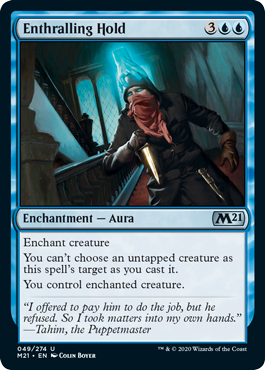
Enthralling Hold
{3}{U}{U}
Enchantment — Aura
Enchant creature
You can't choose an untapped creature as this spell's target as you cast it.
You control enchanted creature.
- The middle ability of Enthralling Hold affects only the choice of target as the spell is cast. If the creature becomes untapped before the spell resolves, it still resolves. If a player is allowed to change the spell's target while it's on the stack, they may choose an untapped creature. If you put Enthralling Hold onto the battlefield without casting it, you may attach it to an untapped creature.
- Gaining control of a permanent doesn't cause you to gain control of any Auras or Equipment attached to it. They'll remain attached, but an Aura's effect that affects "you" still affects its controller rather than you, the controller of an Equipment can move it during their next main phase, and so on.
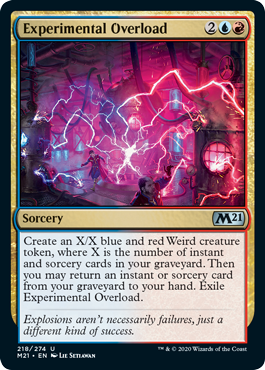
Experimental Overload
{2}{U}{R}
Sorcery
Create an X/X blue and red Weird creature token, where X is the number of instant and sorcery cards in your graveyard. Then you may return an instant or sorcery card from your graveyard to your hand. Exile Experimental Overload.
- The value of X is determined only as Experimental Overload resolves. The Weird's power and toughness don't change if the number of instant and sorcery cards in your graveyard changes.
- Because Experimental Overload is still on the stack while it's resolving, it doesn't count towards the value of X.
- You exile Experimental Overload even if you don't return a card to your hand.
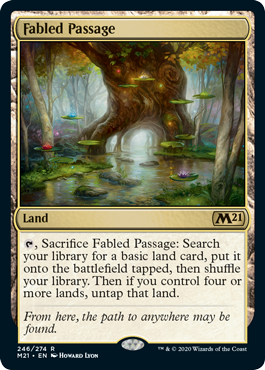
Fabled Passage
Land
{T}, Sacrifice Fabled Passage: Search your library for a basic land card, put it onto the battlefield tapped, then shuffle your library. Then if you control four or more lands, untap that land.
- The land that you put onto the battlefield will be counted when determining whether you control four or more lands, but Fabled Passage will not.
- If you control four or more lands, the basic land doesn't enter the battlefield untapped; it enters tapped and then you untap it.
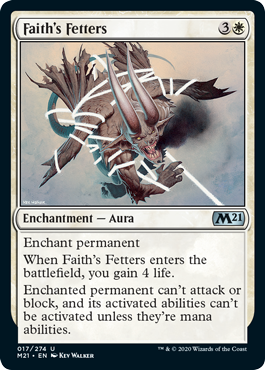
Faith's Fetters
{3}{W}
Enchantment — Aura
Enchant permanent
When Faith's Fetters enters the battlefield, you gain 4 life.
Enchanted permanent can't attack or block, and its activated abilities can't be activated unless they're mana abilities.
- If the target permanent is an illegal target by the time Faith's Fetters tries to resolve, it doesn't resolve. It won't enter the battlefield, so its enters-the-battlefield ability won't trigger.
- Activated abilities contain a colon. They're generally written "[Cost]: [Effect]." Some keywords (such as equip) are activated abilities and will have colons in their reminder text. Loyalty abilities of planeswalkers are activated abilities.
- Faith's Fetters doesn't stop static abilities, triggered abilities, or mana abilities from working. A mana ability is an ability that produces mana, not an ability that costs mana.
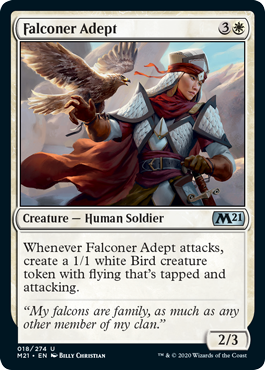
Falconer Adept
{3}{W}
Creature — Human Soldier
2/3
Whenever Falconer Adept attacks, create a 1/1 white Bird creature token with flying that's tapped and attacking.
- You choose which player or planeswalker the Bird token is attacking. It doesn't have to be attacking the same player or planeswalker that Falconer Adept is attacking.
- Although the Bird is an attacking creature, it was never declared as an attacking creature. This means that abilities that trigger whenever a creature attacks won't trigger when it enters the battlefield attacking.
- Any effects that say that the Bird can't attack (such as that of Propaganda) affect only the declaration of attackers. They won't stop the Bird token from entering the battlefield attacking.
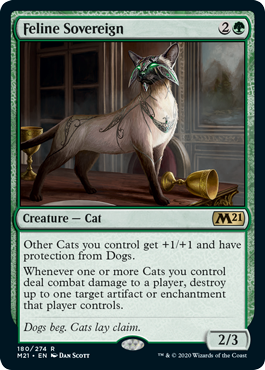
Feline Sovereign
{2}{G}
Creature — Cat
2/3
Other Cats you control get +1/+1 and have protection from Dogs.
Whenever one or more Cats you control deal combat damage to a player, destroy up to one target artifact or enchantment that player controls.
- Because damage remains marked on a creature until the damage is removed as the turn ends, nonlethal damage dealt to a Cat you control may become lethal if Feline Sovereign leaves the battlefield during that turn.
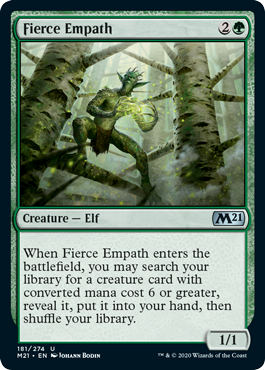
Fierce Empath
{2}{G}
Creature — Elf
1/1
When Fierce Empath enters the battlefield, you may search your library for a creature card with converted mana cost 6 or greater, reveal it, put it into your hand, then shuffle your library.
- If a card in a player's library has {X} in its mana cost, X is considered to be 0.
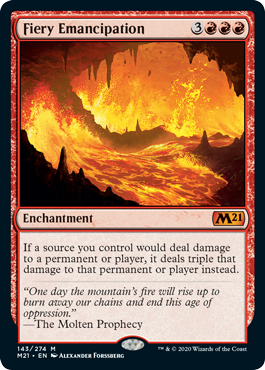
Fiery Emancipation
{3}{R}{R}{R}
Enchantment
If a source you control would deal damage to a permanent or player, it deals triple that damage to that permanent or player instead.
- If a creature with trample you control would deal combat damage to a blocking creature while you control Fiery Emancipation, you must assign its unmodified damage. For example, a 3/3 creature with trample blocked by a 2/2 creature can have 2 damage assigned to the blocking creature and 1 damage assigned to the defending player. It will then deal 6 damage to the blocking creature and 3 damage to the defending player.
- If an effect asks you to divide damage among targets, you must divide the unmodified damage before tripling it.
- If multiple replacement or prevention effects try to modify damage that would be dealt to a permanent or player, the player or the controller of the permanent chooses the order in which they apply.
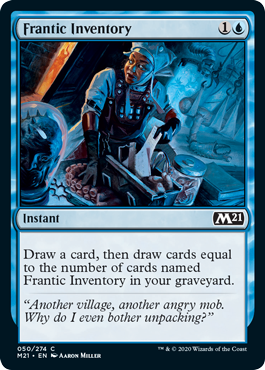
Frantic Inventory
{1}{U}
Instant
Draw a card, then draw cards equal to the number of cards named Frantic Inventory in your graveyard.
- Because Frantic Inventory is still on the stack while it's resolving, it doesn't count towards the number of cards you draw.
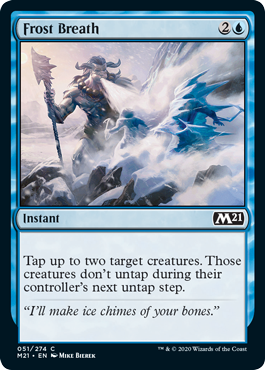
Frost Breath
{2}{U}
Instant
Tap up to two target creatures. Those creatures don't untap during their controller's next untap step.
- Frost Breath can target tapped creatures. If a targeted creature is already tapped when the spell resolves, that creature just remains tapped and doesn't untap during its controller's next untap step.
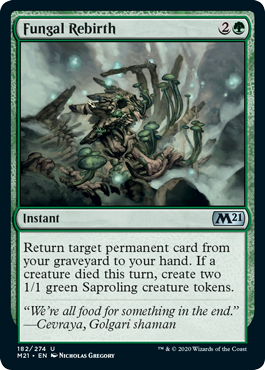
Fungal Rebirth
{2}{G}
Instant
Return target permanent card from your graveyard to your hand. If a creature died this turn, create two 1/1 green Saproling creature tokens.
- A permanent card is an artifact, creature, enchantment, land, or planeswalker card.
- If a creature died this turn, you get Saproling tokens in addition to the permanent card being returned to your hand.
- Fungal Rebirth checks only whether a creature died this turn. It doesn't give you additional Saprolings if more than one creature died.
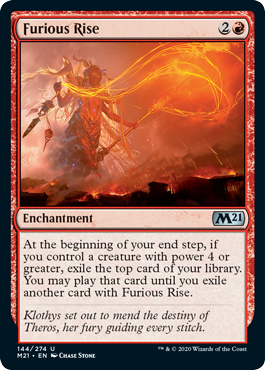
Furious Rise
{2}{R}
Enchantment
At the beginning of your end step, if you control a creature with power 4 or greater, exile the top card of your library. You may play that card until you exile another card with Furious Rise.
- If you don't control a creature with power 4 or greater as your end step begins, Furious Rise's ability doesn't trigger. If you don't control one as the ability resolves, it has no effect. It doesn't have to be the same creature at both times, however.
- Furious Rise's ability has you exile only one card, no matter how many creatures with power 4 or greater you control beyond the first.
- Furious Rise's effect doesn't change when you can play the exiled card. For example, if you exile a sorcery card, you can cast it only during your main phase when the stack is empty. If you exile a land card, you can't play it unless you have land plays available.
- Playing an exiled card causes it to leave exile. You can't play it multiple times.
- If Furious Rise leaves the battlefield before you play the most recently exiled card, you can play that card for as long as it remains exiled.
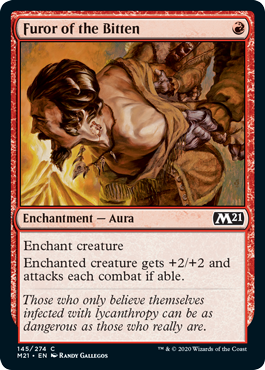
Furor of the Bitten
{R}
Enchantment — Aura
Enchant creature
Enchanted creature gets +2/+2 and attacks each combat if able.
- If the enchanted creature can't attack for any reason (such as being tapped or having come under that player's control that turn), then it doesn't attack. If there's a cost associated with having it attack, the player isn't forced to pay that cost, so it doesn't have to attack in that case either.
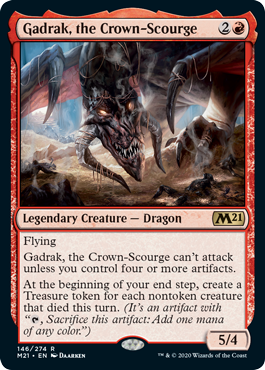
Gadrak, the Crown-Scourge
{2}{R}
Legendary Creature — Dragon
5/4
Flying
Gadrak, the Crown-Scourge can't attack unless you control four or more artifacts.
At the beginning of your end step, create a Treasure token for each nontoken creature that died this turn. (It's an artifact with "{T}, Sacrifice this artifact: Add one mana of any color.")
- Once Gadrak has attacked, it will remain an attacking creature even if you no longer control four or more artifacts.
- Gadrak's last ability counts creatures that died during the entire turn, even ones that died before Gadrak entered the battlefield.
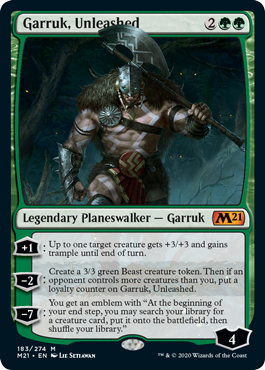
Garruk, Unleashed
{2}{G}{G}
Legendary Planeswalker — Garruk
4
+1: Up to one target creature gets +3/+3 and gains trample until end of turn.
−2: Create a 3/3 green Beast creature token. Then if an opponent controls more creatures than you, put a loyalty counter on Garruk, Unleashed.
−7: You get an emblem with "At the beginning of your end step, you may search your library for a creature card, put it onto the battlefield, then shuffle your library."
- Garruk's second ability gives him only one loyalty counter, no matter how many opponents control how many more creatures than you do.
- If Garruk has only two loyalty counters, activating his second loyalty ability results in him dying before it resolves. He won't be there to get a loyalty counter.
- If the creature you put onto the battlefield with Garruk's emblem's ability during your end step has an ability that triggers at the beginning of your end step, it won't trigger during that end step.
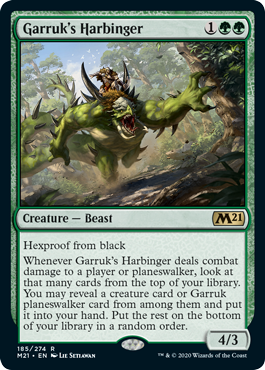
Garruk's Harbinger
{1}{G}{G}
Creature — Beast
4/3
Hexproof from black
Whenever Garruk's Harbinger deals combat damage to a player or planeswalker, look at that many cards from the top of your library. You may reveal a creature card or Garruk planeswalker card from among them and put it into your hand. Put the rest on the bottom of your library in a random order.
- Hexproof from black means that Garruk's Harbinger can't be the target of black spells your opponents control or abilities your opponents control of black sources.
- If Garruk's Harbinger deals damage to a planeswalker greater than their loyalty or to a player greater than their life total, you look at a number of cards equal to that full amount of damage dealt, not just that loyalty or life total.
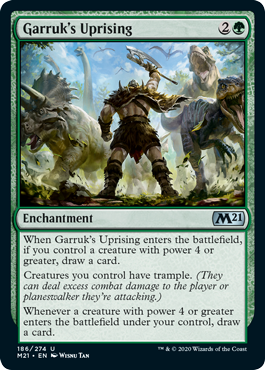
Garruk's Uprising
{2}{G}
Enchantment
When Garruk's Uprising enters the battlefield, if you control a creature with power 4 or greater, draw a card.
Creatures you control have trample. (They can deal excess combat damage to the player or planeswalker they're attacking.)
Whenever a creature with power 4 or greater enters the battlefield under your control, draw a card.
- If you don't control a creature with power 4 or greater immediately after Garruk's Uprising enters the battlefield, its first ability won't trigger. If you don't control one as the ability resolves, you don't draw a card. They don't have to be the same creature both times, however.
- The first ability of Garruk's Uprising has you draw just one card, no matter how many creatures you control with power 4 or greater.
- If a creature is entering the battlefield under your control, consider static abilities to determine whether its power is 4 or greater. Spells, activated abilities, and triggered abilities can't be used to raise the creature's power in time to have Garruk's Uprising's last ability trigger or to lower it in time to stop it from triggering.
- Once the last ability of Garruk's Uprising has triggered, lowering the power of the creature won't stop you from drawing a card.
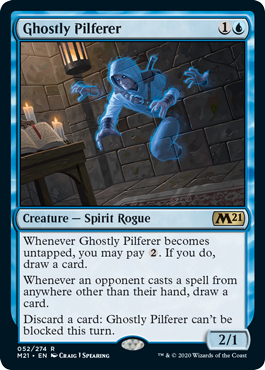
Ghostly Pilferer
{1}{U}
Creature — Spirit Rogue
2/1
Whenever Ghostly Pilferer becomes untapped, you may pay {2}. If you do, draw a card.
Whenever an opponent casts a spell from anywhere other than their hand, draw a card.
Discard a card: Ghostly Pilferer can't be blocked this turn.
- Ghostly Pilferer's first ability triggers during your untap step, but it's put onto the stack at the same time as abilities that trigger at the beginning of your upkeep step. Even though the ability triggered first, you may order it before or after other abilities you control that are put onto the stack at this time.
- While resolving Ghostly Pilferer's first ability, you can't pay more than {2} to draw more than one card.
- An ability that triggers when a player casts a spell resolves before the spell that caused it to trigger. It resolves even if that spell is countered.
- Players can cast spells and activate abilities after the second triggered ability resolves but before the spell that caused it to trigger does.
- Once Ghostly Pilferer has been blocked, activating its last ability doesn't cause it to become unblocked.
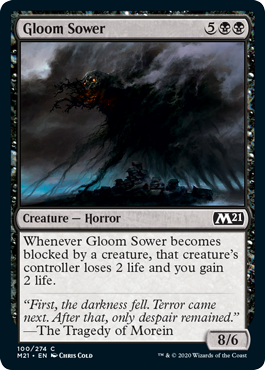
Gloom Sower
{5}{B}{B}
Creature — Horror
8/6
Whenever Gloom Sower becomes blocked by a creature, that creature's controller loses 2 life and you gain 2 life.
- If the creature that blocked Gloom Sower leaves the battlefield before Gloom Sower's triggered ability resolves, the player who controlled it before it left is the player who loses 2 life.
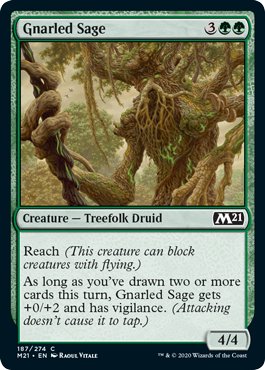
Gnarled Sage
{3}{G}{G}
Creature — Treefolk Druid
4/4
Reach (This creature can block creatures with flying.)
As long as you've drawn two or more cards this turn, Gnarled Sage gets +0/+2 and has vigilance. (Attacking doesn't cause it to tap.)
- If a spell or ability causes you to put a card into your hand without specifically using the word "draw," it's not a card drawn.
- Gnarled Sage gets +0/+2 just once, no matter how many cards you've drawn past the second.
- If Gnarled Sage gains vigilance after it has attacked, it won't become untapped.
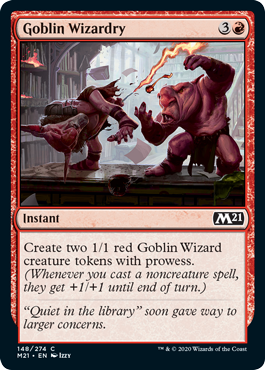
Goblin Wizardry
{3}{R}
Instant
Create two 1/1 red Goblin Wizard creature tokens with prowess. (Whenever you cast a noncreature spell, they get +1/+1 until end of turn.)
- A token's name is the concatenation of its creature types assigned at creation. This means that the tokens created by Goblin Wizardry are named Goblin Wizard. These tokens have the same name as the card Goblin Wizard and so can be affected by things that ask players to choose a card name, such as Runed Halo.
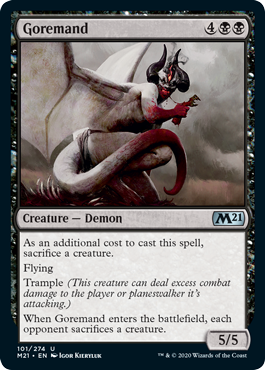
Goremand
{4}{B}{B}
Creature — Demon
5/5
As an additional cost to cast this spell, sacrifice a creature.
Flying
Trample (This creature can deal excess combat damage to the player or planeswalker it's attacking.)
When Goremand enters the battlefield, each opponent sacrifices a creature.
- As Goremand's triggered ability resolves, first the next opponent in turn order (or, if it's an opponent's turn, the opponent whose turn it is) chooses a creature they control, then each other opponent in turn order does the same knowing the choices made before them. Then all the chosen creatures are sacrificed at the same time.
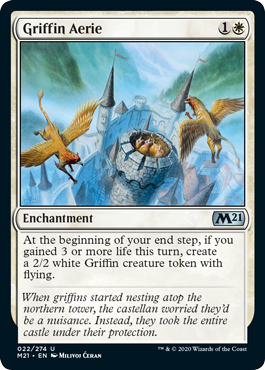
Griffin Aerie
{1}{W}
Enchantment
At the beginning of your end step, if you gained 3 or more life this turn, create a 2/2 white Griffin creature token with flying.
- You create just one Griffin token, no matter how much life you've gained past 3 life.
- Griffin Aerie's ability looks at how much life you've gained in the turn, even if it wasn't on the battlefield when you gained life. It doesn't care if you also lost life, even if you lost more life than you gained.
- If you haven't gained 3 life by the time your end step begins, Griffin Aerie's ability won't trigger at all.
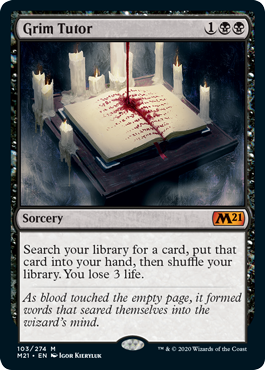
Grim Tutor
{1}{B}{B}
Sorcery
Search your library for a card, put that card into your hand, then shuffle your library. You lose 3 life.
- You don't reveal the card you search for.
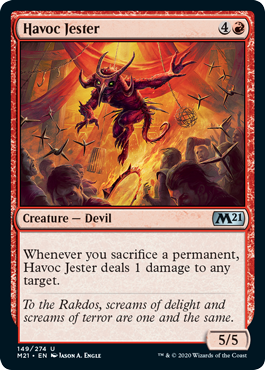
Havoc Jester
{4}{R}
Creature — Devil
5/5
Whenever you sacrifice a permanent, Havoc Jester deals 1 damage to any target.
- Havoc Jester's ability is a triggered ability, not an activated ability. It doesn't allow you to sacrifice a permanent whenever you want; rather, you need some other way of sacrificing permanents.
- If you sacrifice a permanent as part of casting a spell or activating an ability, Havoc Jester's ability will resolve before that spell or ability.
- Havoc Jester's ability triggers when you sacrifice it. If you sacrifice other permanents at the same time, it triggers for them as well.
- A legendary permanent that is put into a graveyard because of the "legend rule" isn't sacrificed.
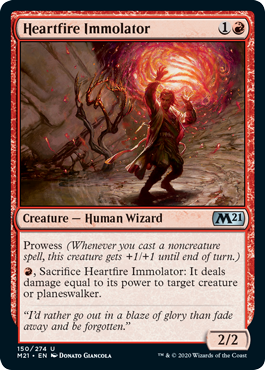
Heartfire Immolator
{1}{R}
Creature — Human Wizard
2/2
Prowess (Whenever you cast a noncreature spell, this creature gets +1/+1 until end of turn.)
{R}, Sacrifice Heartfire Immolator: It deals damage equal to its power to target creature or planeswalker.
- Use Heartfire Immolator's power as it last existed on the battlefield to determine how much damage its last ability deals.
- Players can't take any actions between the time you begin to activate Heartfire Immolator's last ability and the time it's sacrificed. Notably, opponents can't try to lower its power.
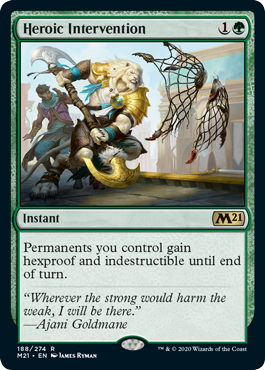
Heroic Intervention
{1}{G}
Instant
Permanents you control gain hexproof and indestructible until end of turn.
- The set of permanents affected by Heroic Intervention is determined as the spell resolves. Permanents you begin to control later in the turn won't gain hexproof and indestructible.
- A planeswalker with indestructible still loses loyalty counters as it's dealt damage and will still be put into its owner's graveyard if its loyalty reaches 0.
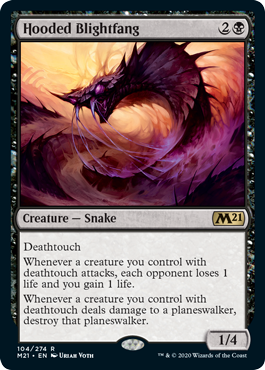
Hooded Blightfang
{2}{B}
Creature — Snake
1/4
Deathtouch
Whenever a creature you control with deathtouch attacks, each opponent loses 1 life and you gain 1 life.
Whenever a creature you control with deathtouch deals damage to a planeswalker, destroy that planeswalker.
- Hooded Blightfang's triggered abilities trigger when it attacks and when it deals damage to a planeswalker, as long as it still has deathtouch.
- In a Two-Headed Giant game, Hooded Blightfang's middle ability causes the opposing team to lose 2 life and you to gain 1 life.
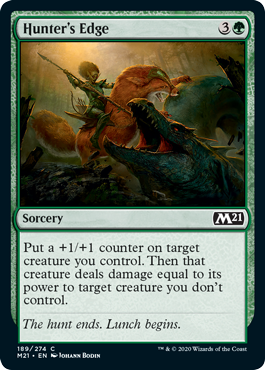
Hunter's Edge
{3}{G}
Sorcery
Put a +1/+1 counter on target creature you control. Then that creature deals damage equal to its power to target creature you don't control.
- You can't cast Hunter's Edge unless you choose both a creature you control and a creature you don't control as targets.
- If either creature is an illegal target as Hunter's Edge tries to resolve, the creature you control won't deal damage.
- If the creature you don't control is an illegal target as Hunter's Edge tries to resolve but the creature you control is a legal target, you just put a +1/+1 counter on the creature you control.
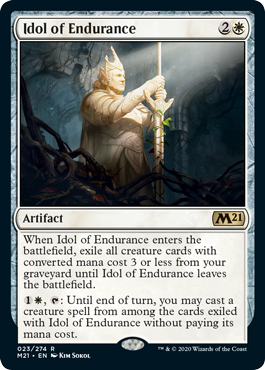
Idol of Endurance
{2}{W}
Artifact
When Idol of Endurance enters the battlefield, exile all creature cards with converted mana cost 3 or less from your graveyard until Idol of Endurance leaves the battlefield.
{1}{W}, {T}: Until end of turn, you may cast a creature spell from among the cards exiled with Idol of Endurance without paying its mana cost.
- The exiled cards return to your graveyard immediately after Idol of Endurance leaves the battlefield. Any cards that had left exile before then (most likely because they were cast with Idol of Endurance's second ability) remain in their current zone.
- If a card in a player's graveyard has {X} in its mana cost, X is considered to be 0.
- The last ability of Idol of Endurance doesn't change when you may cast those creature spells. Normally this means during your main phase while the stack is empty, but you can cast a creature spell with flash at other times.
- If you cast a spell "without paying its mana cost," you can't choose to cast it for any alternative costs. You can, however, pay additional costs. If the card has any mandatory additional costs, those must be paid to cast the spell.
- If a spell has {X} in its mana cost, you must choose 0 as the value of X when casting it without paying its mana cost.
- If you cast a spell with Idol of Endurance's last ability, it becomes a new object. If it returns to exile, it's no longer exiled with Idol of Endurance, and won't be returned to your graveyard once Idol of Endurance leaves the battlefield.
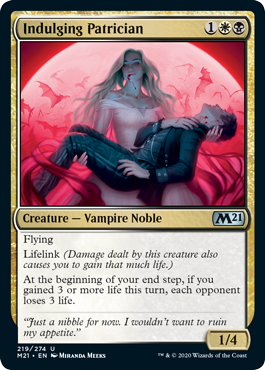
Indulging Patrician
{1}{W}{B}
Creature — Vampire Noble
1/4
Flying
Lifelink (Damage dealt by this creature also causes you to gain that much life.)
At the beginning of your end step, if you gained 3 or more life this turn, each opponent loses 3 life.
- Each opponent loses just 3 life, no matter how much life you've gained past 3 life.
- Indulging Patrician's last ability looks at how much life you've gained in the turn, even if it wasn't on the battlefield when you gained life. It doesn't care if you also lost life, even if you lost more life than you gained.
- If you haven't gained 3 life by the time your end step begins, Indulging Patrician's last ability won't trigger at all.
- In a Two-Headed Giant game, Indulging Patrician's last ability causes the opposing team to lose 6 life.
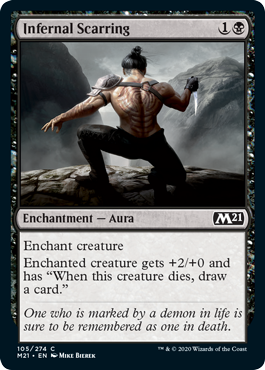
Infernal Scarring
{1}{B}
Enchantment — Aura
Enchant creature
Enchanted creature gets +2/+0 and has "When this creature dies, draw a card."
- The player who controlled the creature when it died is the one who will draw a card.
- If Infernal Scarring and the enchanted creature are destroyed at the same time, the player will draw a card.
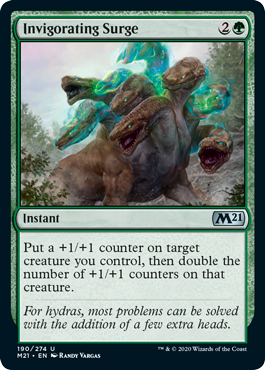
Invigorating Surge
{2}{G}
Instant
Put a +1/+1 counter on target creature you control, then double the number of +1/+1 counters on that creature.
- To double the number of +1/+1 counters on a creature, put a number of +1/+1 counters on it equal to the number it already has. Other cards that interact with putting counters on it will interact with this effect accordingly.
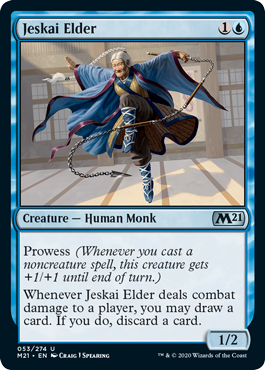
Jeskai Elder
{1}{U}
Creature — Human Monk
1/2
Prowess (Whenever you cast a noncreature spell, this creature gets +1/+1 until end of turn.)
Whenever Jeskai Elder deals combat damage to a player, you may draw a card. If you do, discard a card.
- You draw a card and discard a card all while Jeskai Elder's ability is resolving. Nothing can happen between the two, and no player may choose to take actions.
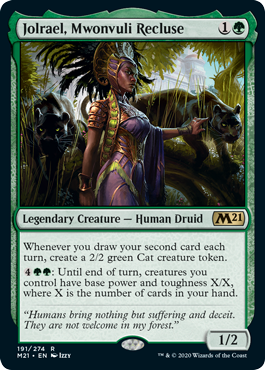
Jolrael, Mwonvuli Recluse
{1}{G}
Legendary Creature — Human Druid
1/2
Whenever you draw your second card each turn, create a 2/2 green Cat creature token.
{4}{G}{G}: Until end of turn, creatures you control have base power and toughness X/X, where X is the number of cards in your hand.
- The triggered ability can trigger only once each turn. It doesn't matter if Jolrael was on the battlefield when the first card was drawn. If it's not on the battlefield when the second card is drawn, the ability can't trigger at all that turn. It won't trigger when the third or fourth card is drawn.
- If a spell or ability causes you to put a card into your hand without specifically using the word "draw," it's not a card drawn.
- Jolrael's last ability overwrites all previous effects that set the affected creatures' power and/or toughness to specific values. Other effects that set these characteristics to specific values that start to apply after the ability resolves will overwrite that part of the effect.
- Effects that modify an affected creature's power or toughness without setting it will apply no matter when they started to take effect. The same is true for counters that change the creature's power or toughness.
- The value of X is determined only as Jolrael's last ability resolves. Once that happens, the value of X won't change later in the turn even if the number of cards in your hand changes.
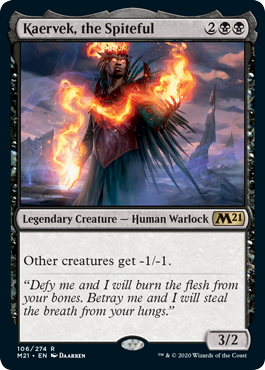
Kaervek, the Spiteful
{2}{B}{B}
Legendary Creature — Human Warlock
3/2
Other creatures get -1/-1.
- Because damage remains marked on a creature until the damage is removed as the turn ends, nonlethal damage dealt to creatures may become lethal if Kaervek enters the battlefield during that turn.
- If you control more than one Kaervek, each will give each other creature -1/-1. If these effects cause a creature's toughness to become less than or equal to 0 or the amount of damage marked on it, those creatures die at the same time that the "legend rule" remove your excess Kaerveks.
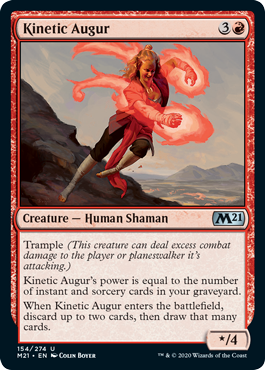
Kinetic Augur
{3}{R}
Creature — Human Shaman
*/4
Trample (This creature can deal excess combat damage to the player or planeswalker it's attacking.)
Kinetic Augur's power is equal to the number of instant and sorcery cards in your graveyard.
When Kinetic Augur enters the battlefield, discard up to two cards, then draw that many cards.
- The ability that defines Kinetic Augur's power works in all zones, not just on the battlefield.
- As Kinetic Augur's triggered ability resolves, you choose whether to discard zero, one, or two cards, discard them, and draw that many. You can't discard one card, draw a card, then choose to discard again.
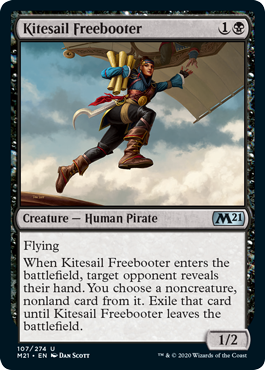
Kitesail Freebooter
{1}{B}
Creature — Human Pirate
1/2
Flying
When Kitesail Freebooter enters the battlefield, target opponent reveals their hand. You choose a noncreature, nonland card from it. Exile that card until Kitesail Freebooter leaves the battlefield.
- If Kitesail Freebooter leaves the battlefield before its enters-the-battlefield ability resolves, the opponent will reveal their hand, but no card will be exiled.
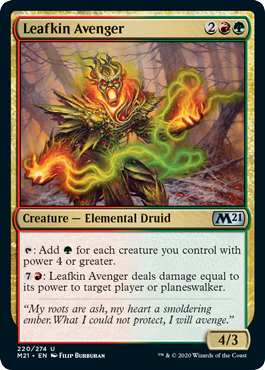
Leafkin Avenger
{2}{R}{G}
Creature — Elemental Druid
4/3
{T}: Add {G} for each creature with power 4 or greater you control.
{7}{R}: Leafkin Avenger deals damage equal to its power to target player or planeswalker.
- If Leafkin Avenger leaves the battlefield while its last ability is on the stack, use its power as it last existed on the battlefield to determine how much damage it deals.
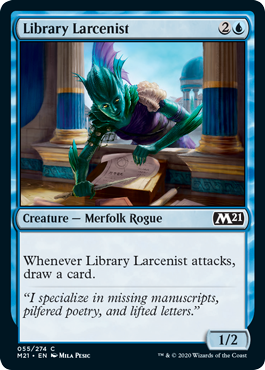
Library Larcenist
{2}{U}
Creature — Merfolk Rogue
1/2
Whenever Library Larcenist attacks, draw a card.
- You may cast spells and activate abilities after the card has been drawn but before blockers are declared.
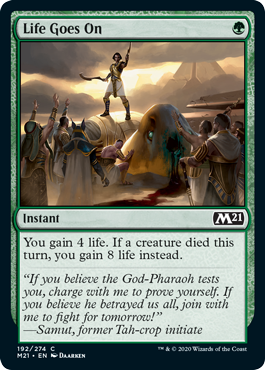
Life Goes On
{G}
Instant
You gain 4 life. If a creature died this turn, you gain 8 life instead.
- You won't gain more than 8 life if more than one creature died this turn.
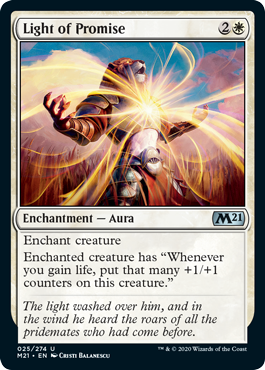
Light of Promise
{2}{W}
Enchantment — Aura
Enchant creature
Enchanted creature has "Whenever you gain life, put that many +1/+1 counters on this creature."
- If enchanted creature is dealt lethal damage at the same time that you gain life, it won't receive a counter from its ability in time to save it.
- Each creature with lifelink dealing combat damage causes a separate life-gaining event. For example, if two creatures you control with lifelink deal combat damage at the same time, the ability will trigger twice. However, if a single creature you control with lifelink deals combat damage to multiple creatures, players, and/or planeswalkers at the same time (perhaps because it has trample or was blocked by more than one creature), the ability will trigger only once.
- If you gain an amount of life "for each" of something, that life is gained as one event and the ability triggers only once.
- In a Two-Headed Giant game, life gained by your teammate won't cause the ability to trigger, even though it caused your team's life total to increase.
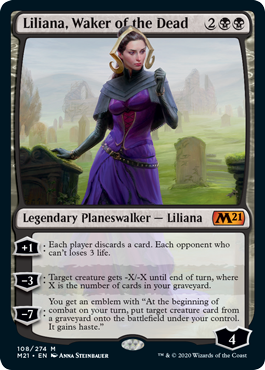
Liliana, Waker of the Dead
{2}{B}{B}
Legendary Planeswalker — Liliana
4
+1: Each player discards a card. Each opponent who can't loses 3 life.
−3: Target creature gets -X/-X until end of turn, where X is the number of cards in your graveyard.
−7: You get an emblem with "At the beginning of combat on your turn, put target creature card from a graveyard onto the battlefield under your control. It gains haste."
- As Liliana's first ability resolves, first the player whose turn it is chooses a card in hand without revealing it, then each other player in turn order does the same. Then all the chosen cards are discarded at the same time. Finally, each opponent who couldn't discard a card loses 3 life.
- A player who has a card in hand can't choose to lose 3 life instead of discarding a card.
- If you have no cards in hand, you just don't discard anything. You don't lose 3 life. Other players still discard if able.
- The value of X is determined only as Liliana's second ability resolves. Once that happens, the value of X won't change later in the turn even if the number of cards in your graveyard changes.
- Creatures put onto the battlefield with Liliana's emblem gain haste indefinitely.
- In a multiplayer game, if a player leaves the game, all cards that player owns leave as well. If you leave the game, any permanents you control from Liliana's emblem are exiled.
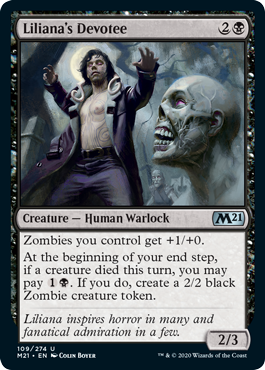
Liliana's Devotee
{2}{B}
Creature — Human Warlock
2/3
Zombies you control get +1/+0.
At the beginning of your end step, if a creature died this turn, you may pay {1}{B}. If you do, create a 2/2 black Zombie creature token.
- If a creature didn't die before your end step begins, the last ability of Liliana's Devotee doesn't trigger at all. The creature may have died before Liliana's Devotee entered the battlefield, however.
- The triggered ability triggers just once, no matter how many creatures died this turn.
- While resolving the triggered ability, you can't pay more than {1}{B} to get more than one Zombie token.
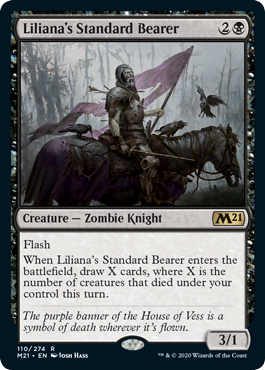
Liliana's Standard Bearer
{2}{B}
Creature — Zombie Knight
3/1
Flash
When Liliana's Standard Bearer enters the battlefield, draw X cards, where X is the number of creatures that died under your control this turn.
- The value of X is determined only as the triggered ability resolves. If Liliana's Standard Bearer dies while that ability's on the stack, it will count itself.
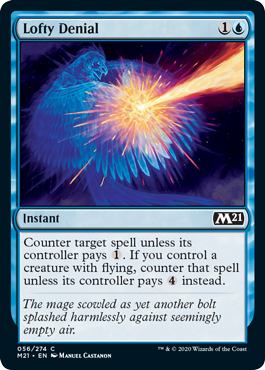
Lofty Denial
{1}{U}
Instant
Counter target spell unless its controller pays {1}. If you control a creature with flying, counter that spell unless its controller pays {4} instead.
- If you control more than one creature with flying, Lofty Denial still requires only {4}.
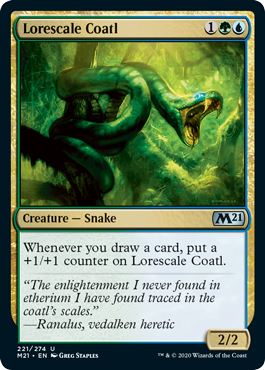
Lorescale Coatl
{1}{G}{U}
Creature — Snake
2/2
Whenever you draw a card, put a +1/+1 counter on Lorescale Coatl.
- If a spell or ability causes you to put a card into your hand without specifically using the word "draw," it's not a card drawn.
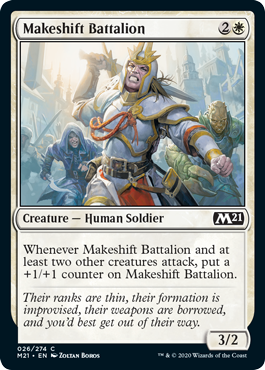
Makeshift Battalion
{2}{W}
Creature — Human Soldier
3/2
Whenever Makeshift Battalion and at least two other creatures attack, put a +1/+1 counter on Makeshift Battalion.
- Once Makeshift Battalion's ability has triggered, it doesn't matter how many creatures are still attacking when that ability resolves.
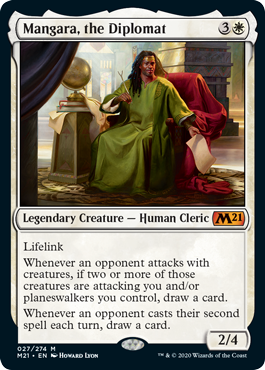
Mangara, the Diplomat
{3}{W}
Legendary Creature — Human Cleric
2/4
Lifelink
Whenever an opponent attacks with creatures, if two or more of those creatures are attacking you and/or planeswalkers you control, draw a card.
Whenever an opponent casts their second spell each turn, draw a card.
- If some of the attacking creatures leave the battlefield while Mangara's triggered ability is on the stack, use the player or planeswalker they were attacking before they left to determine whether you draw a card. On the other hand, if they're removed from combat without leaving the battlefield, use their current information to determine that they're not attacking you or a planeswalker you control anymore.
- If your opponent attacks you with one creature and your planeswalker with another, you draw a card.
- You draw just one card, no matter how many creatures are attacking you and your planeswalkers beyond the second.
- An ability that triggers when a player casts a spell resolves before the spell that caused it to trigger. It resolves even if that spell is countered.
- Players can cast spells and activate abilities after the triggered ability resolves but before the spell that caused it to trigger does.
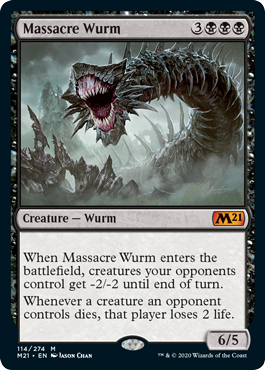
Massacre Wurm
{3}{B}{B}{B}
Creature — Wurm
6/5
When Massacre Wurm enters the battlefield, creatures your opponents control get -2/-2 until end of turn.
Whenever a creature an opponent controls dies, that player loses 2 life.
- Massacre Wurm's first ability affects only creatures your opponents control at the time it resolves. Creatures they begin to control later in the turn won't get -2/-2.
- Massacre Wurm's triggered ability triggers if a creature an opponent controls dies for any reason, including from its first ability reducing its toughness to 0, as long as Massacre Wurm remains on the battlefield.
- If a creature an opponent controls dies at the same time as Massacre Wurm, Massacre Wurm's last ability triggers for that creature.
- If your life total is brought to 0 or less at the same time that a creature an opponent controls is dealt lethal damage, you lose the game before Massacre Wurm's last ability goes on the stack.
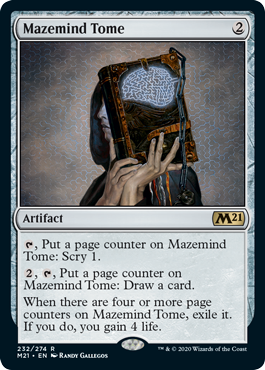
Mazemind Tome
{2}
Artifact
{T}, Put a page counter on Mazemind Tome: Scry 1.
{2}, {T}, Put a page counter on Mazemind Tome: Draw a card.
When there are four or more page counters on Mazemind Tome, exile it. If you do, you gain 4 life.
- If Mazemind Tome leaves the battlefield while its triggered ability is on the stack, you can't exile it from the zone it's put into.
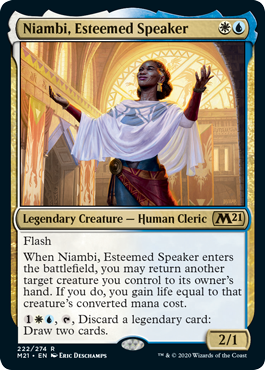
Niambi, Esteemed Speaker
{W}{U}
Legendary Creature — Human Cleric
2/1
Flash
When Niambi, Esteemed Speaker enters the battlefield, you may return another target creature you control to its owner's hand. If you do, you gain life equal to that creature's converted mana cost.
{1}{W}{U}, {T}, Discard a legendary card: Draw two cards.
- If a creature on the battlefield has {X} in its mana cost, X is considered to be 0.
- If the target creature is an illegal target by the time Niambi's triggered ability tries to resolve, the ability won't resolve. You won't return the card from the zone it moved to or gain any life.
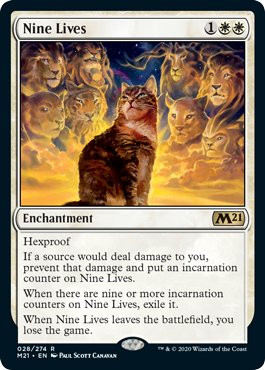
Nine Lives
{1}{W}{W}
Enchantment
Hexproof
If a source would deal damage to you, prevent that damage and put an incarnation counter on Nine Lives.
When there are nine or more incarnation counters on Nine Lives, exile it.
When Nine Lives leaves the battlefield, you lose the game.
- If more than one source deals damage to you at once, prevent the damage from each of them and put that many incarnation counters on Nine Lives, even if this causes more than nine incarnation counters to be on Nine Lives. Leave it to cats to abuse loopholes.
- If damage that a source would deal to you can't be prevented, you still put an incarnation counter on Nine Lives.
- Once the first triggered ability is on the stack, it won't trigger again, even if more damage is prevented and more incarnation counters are put onto it.
- If you counter the first triggered ability or otherwise remove it from the stack, it will just trigger again immediately if Nine Lives still has nine or more incarnation counters on it.
- The last ability of Nine Lives triggers no matter how it leaves the battlefield.
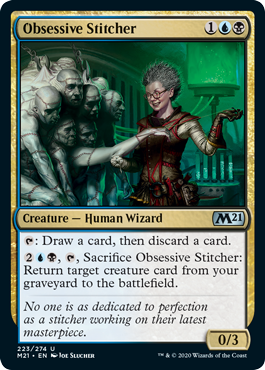
Obsessive Stitcher
{1}{U}{B}
Creature — Human Wizard
0/3
{T}: Draw a card, then discard a card.
{2}{U}{B}, {T}, Sacrifice Obsessive Stitcher: Return target creature card from your graveyard to the battlefield.
- You draw a card and discard a card all while Obsessive Stitcher's first ability is resolving. Nothing can happen between the two, and no player may choose to take actions.
- Obsessive Stitcher can't be the target of its last ability.
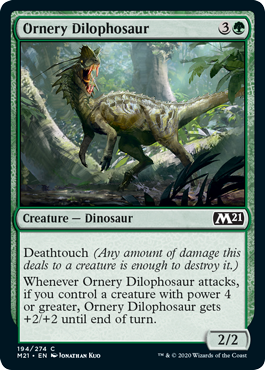
Ornery Dilophosaur
{3}{G}
Creature — Dinosaur
2/2
Deathtouch (Any amount of damage this deals to a creature is enough to destroy it.)
Whenever Ornery Dilophosaur attacks, if you control a creature with power 4 or greater, Ornery Dilophosaur gets +2/+2 until end of turn.
- If you don't control a creature with power 4 or greater immediately after Ornery Dilophosaur attacks, its ability doesn't trigger. If you don't control one as the ability resolves, it has no effect. It doesn't have to be the same creature at both times, however.
- If Ornery Dilophosaur's power is raised to 4 or greater, its ability triggers when it attacks.
- Ornery Dilophosaur gets just +2/+2, no matter how many creatures you control with power 4 or greater.
- Once Ornery Dilophosaur's ability has resolved, it keeps +2/+2 for the rest of the turn even if you no longer control a creature with power 4 or greater.

Pack Leader
{1}{W}
Creature — Dog
2/2
Other Dogs you control get +1/+1.
Whenever Pack Leader attacks, prevent all combat damage that would be dealt this turn to Dogs you control.
- Because damage remains marked on a creature until the damage is removed as the turn ends, nonlethal damage dealt to a Dog you control may become lethal if Pack Leader leaves the battlefield during that turn.
- Once Pack Leader attacks, its effect prevents damage that would be dealt to Dogs you control even if Pack Leader leaves the battlefield.
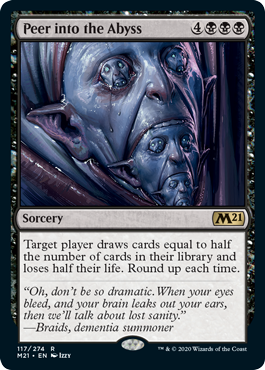
Peer into the Abyss
{4}{B}{B}{B}
Sorcery
Target player draws cards equal to half the number of cards in their library and loses half their life. Round up each time.
- The life lost is rounded up, not the remaining life total. For example, if the target player has 7 life, they lose 4 life and end up with 3. Similarly, the number of cards drawn is rounded up, not the number of cards remaining in the library.
- To draw the cards, first the player determines how many cards to draw, then draws them. This event may be modified so that a different number of cards are actually drawn.
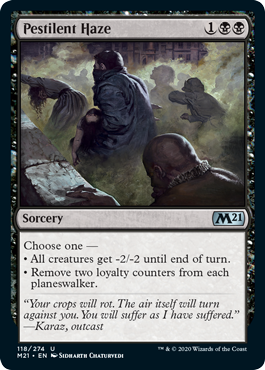
Pestilent Haze
{1}{B}{B}
Sorcery
Choose one —
• All creatures get -2/-2 until end of turn.
• Remove two loyalty counters from each planeswalker.
- Pestilent Haze's first mode affects only creatures on the battlefield at the time it resolves. Creatures that enter the battlefield later in the turn won't get -2/-2.
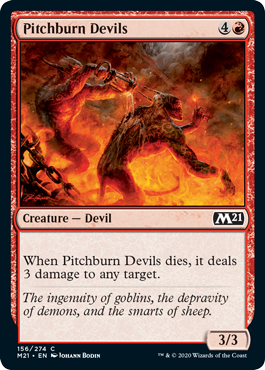
Pitchburn Devils
{4}{R}
Creature — Devil
3/3
When Pitchburn Devils dies, it deals 3 damage to any target.
- If your life total is brought to 0 or less at the same time that Pitchburn Devils is dealt lethal damage, you lose the game before the ability goes on the stack.
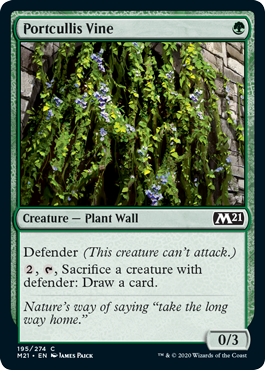
Portcullis Vine
{G}
Creature — Plant Wall
0/3
Defender (This creature can't attack.)
{2}, {T}, Sacrifice a creature with defender: Draw a card.
- Portcullis Vine can be sacrificed to pay the cost of its last ability.
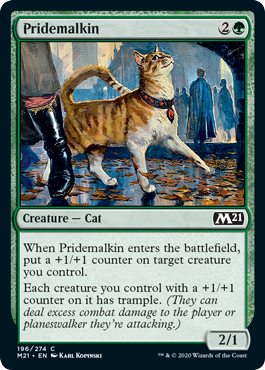
Pridemalkin
{2}{G}
Creature — Cat
2/1
When Pridemalkin enters the battlefield, put a +1/+1 counter on target creature you control.
Each creature you control with a +1/+1 counter on it has trample. (They can deal excess combat damage to the player or planeswalker they're attacking.)
- Pridemalkin can be the target of its own first ability.
- Pridemalkin's second ability applies to Pridemalkin as long as it has a +1/+1 counter on it.
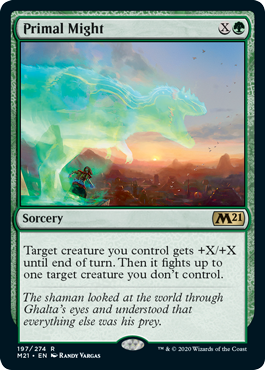
Primal Might
{X}{G}
Sorcery
Target creature you control gets +X/+X until end of turn. Then it fights up to one target creature you don't control.
- You can cast Primal Might targeting only the creature you control.
- You can cast Primal Might with 0 as the value of X to just have the two target creatures fight.
- If you choose two target creatures and either target is an illegal target as Primal Might tries to resolve, neither creature will deal or be dealt damage.
- If the creature you control is an illegal target as Primal Might tries to resolve, no creature gets +X/+X. If that creature is a legal target but the creature you don't control isn't, it still gets +X/+X.
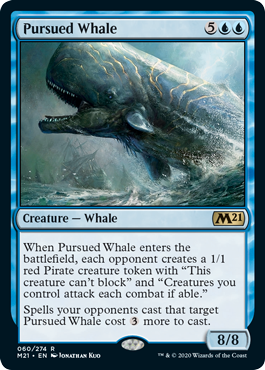
Pursued Whale
{5}{U}{U}
Creature — Whale
8/8
When Pursued Whale enters the battlefield, each opponent creates a 1/1 red Pirate creature token with "This creature can't block" and "Creatures you control attack each combat if able."
Spells your opponents cast that target Pursued Whale cost {3} more to cast.
- If a creature affected by the Pirate token can't attack for any reason (such as being tapped or having come under that player's control that turn), then it doesn't attack. If there's a cost associated with having it attack, the player isn't forced to pay that cost, so it doesn't have to attack in that case either.
- To determine the total cost of a spell, start with the mana cost or alternative cost you're paying, add any cost increases (such as that of Pursued Whale), then apply any cost reductions. The converted mana cost of the spell remains unchanged, no matter what the total cost to cast it was.
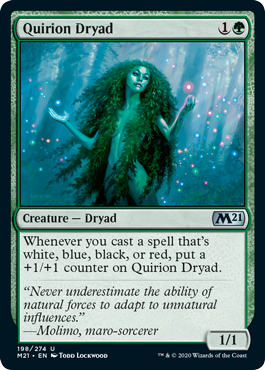
Quirion Dryad
{1}{G}
Creature — Dryad
1/1
Whenever you cast a spell that's white, blue, black, or red, put a +1/+1 counter on Quirion Dryad.
- An ability that triggers when a player casts a spell resolves before the spell that caused it to trigger. It resolves even if that spell is countered.
- If you cast a spell that's more than one color, Quirion Dryad's ability triggers just once.
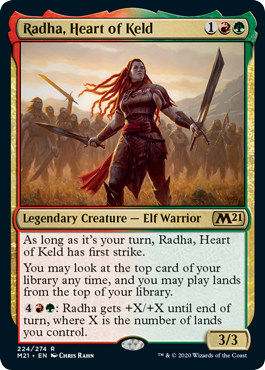
Radha, Heart of Keld
{1}{R}{G}
Legendary Creature — Elf Warrior
3/3
As long as it's your turn, Radha, Heart of Keld has first strike.
You may look at the top card of your library any time, and you may play lands from the top of your library.
{4}{R}{G}: Radha gets +X/+X until end of turn, where X is the number of lands you control.
- Radha doesn't allow you to play additional lands.
- Radha lets you look at the top card of your library whenever you want (with one restriction; see below), even if you don't have priority. This action doesn't use the stack. Knowing what that card is becomes part of the information you have access to, just like you can look at the cards in your hand.
- If the top card of your library changes while you're casting a spell, playing a land, or activating an ability, you can't look at the new top card until you finish doing so. This means that if you play a land from the top of your library and it has a replacement effect that requires you to make a decision (such as that of Temple Garden), you must make that decision without knowing the next card of your library.
- The value of X is determined only as Radha's last ability resolves. Once that happens, the value of X won't change later in the turn even if the number of lands you control changes.
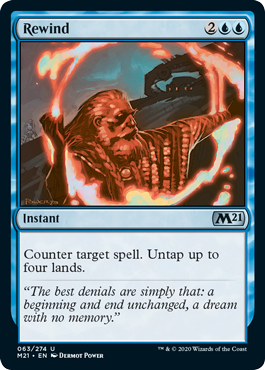
Rewind
{2}{U}{U}
Instant
Counter target spell. Untap up to four lands.
- Rewind targets only a spell. It doesn't target any lands. The lands are chosen as Rewind resolves.
- You can choose up to four lands, no matter who controls any of them. Those lands untap once. You can't choose one land and have it untap four times, for example.
- If the spell is an illegal target when Rewind tries to resolve, perhaps because it was countered by another spell or ability, Rewind won't resolve and none of its effects will happen. You won't untap any lands.
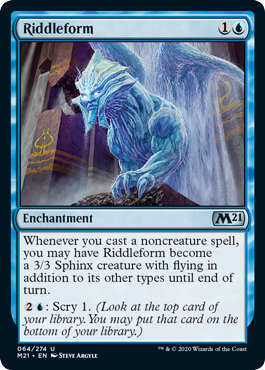
Riddleform
{1}{U}
Enchantment
Whenever you cast a noncreature spell, you may have Riddleform become a 3/3 Sphinx creature with flying in addition to its other types until end of turn.
{2}{U}: Scry 1. (Look at the top card of your library. You may put that card on the bottom of your library.)
- Riddleform's first ability resolves before the spell that caused it to trigger but after targets for that spell are chosen. It will resolve even if that spell is countered.
- If Riddleform becomes a creature the same turn it enters the battlefield, you can't attack with it unless it gains haste.
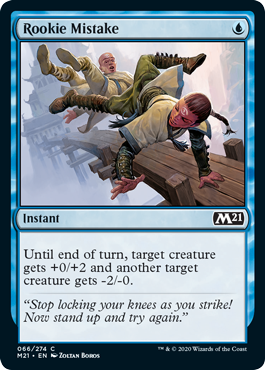
Rookie Mistake
{U}
Instant
Until end of turn, target creature gets +0/+2 and another target creature gets -2/-0.
- You can't cast Rookie Mistake unless you choose two creatures as targets.
- If one target creature becomes an illegal target before Rookie Mistake resolves, the other is affected as appropriate.
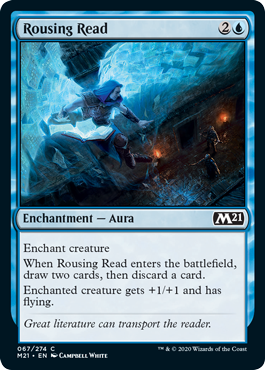
Rousing Read
{2}{U}
Enchantment — Aura
Enchant creature
When Rousing Read enters the battlefield, draw two cards, then discard a card.
Enchanted creature gets +1/+1 and has flying.
- If the creature Rousing Read would enchant is an illegal target by the time the Aura spell resolves, the entire spell doesn't resolve. It won't enter the battlefield, so its ability won't trigger.
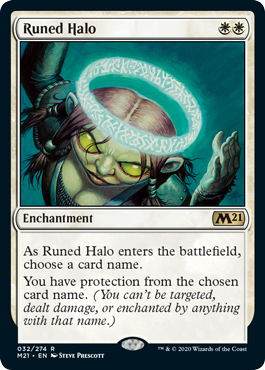
Runed Halo
{W}{W}
Enchantment
As Runed Halo enters the battlefield, choose a card name.
You have protection from the chosen card name. (You can't be targeted, dealt damage, or enchanted by anything with that name.)
- Runed Halo can't protect you from tokens unless those tokens have the same name as the card name you choose.
- Some cards can have alternative names, such as split cards, adventurer cards, double-faced cards, and so on. You may choose one of the two names the card can have; Runed Halo won't protect you from the other name.
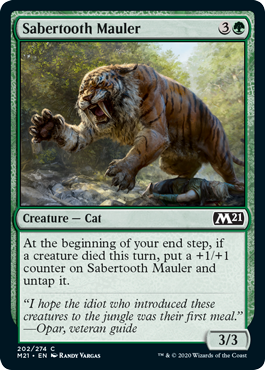
Sabertooth Mauler
{3}{G}
Creature — Cat
3/3
At the beginning of your end step, if a creature died this turn, put a +1/+1 counter on Sabertooth Mauler and untap it.
- If a creature didn't die before your end step begins, Sabertooth Mauler's ability doesn't trigger at all. The creature may have died before Sabertooth Mauler entered the battlefield, however.
- The triggered ability triggers just once, no matter how many creatures died this turn.
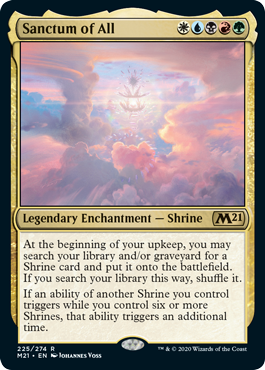
Sanctum of All
{W}{U}{B}{R}{G}
Legendary Enchantment — Shrine
At the beginning of your upkeep, you may search your library and/or graveyard for a Shrine card and put it onto the battlefield. If you search your library this way, shuffle it.
If an ability of another Shrine you control triggers while you control six or more Shrines, that ability triggers an additional time.
- If the Shrine you put onto the battlefield with Sanctum of All's first ability during your upkeep has an ability that triggers at the beginning of your upkeep, it won't trigger during that upkeep.
- Triggered abilities use the word "when," "whenever," or "at." They're often written as "[Trigger condition], [effect]." Replacement effects, using "instead" or "as," aren't affected. Activated abilities (written as "Cost: Effect") of Shrines you control are also not affected.
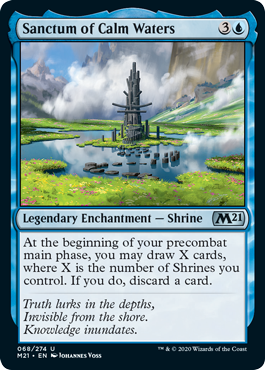
Sanctum of Calm Waters
{3}{U}
Legendary Enchantment — Shrine
At the beginning of your precombat main phase, you may draw X cards, where X is the number of Shrines you control. If you do, discard a card.
- You draw X cards and discard a card all while the triggered ability is resolving. Nothing can happen between the two, and no player may choose to take actions.
- If Sanctum of Calm Waters leaves the battlefield while its ability is on the stack, you may control no Shrines as the ability resolves. If so, you may choose to draw zero cards and discard one, or you may choose not to draw zero cards and not discard a card.

Sanctum of Stone Fangs
{1}{B}
Legendary Enchantment — Shrine
At the beginning of your precombat main phase, each opponent loses X life and you gain X life, where X is the number of Shrines you control.
- If Sanctum of Stone Fangs leaves the battlefield while its ability is on the stack, you may control no Shrines as the ability resolves. In that case, no player gains or loses any life.
- In a Two-Headed Giant game, Sanctum of Stone Fangs causes the opposing team to lose twice X life and you to gain X life.
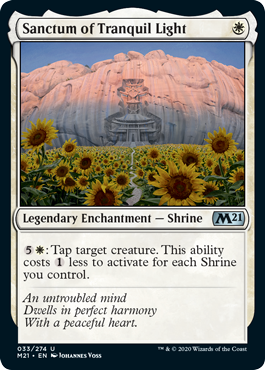
Sanctum of Tranquil Light
{W}
Legendary Enchantment — Shrine
{5}{W}: Tap target creature. This ability costs {1} less to activate for each Shrine you control.
- The cost reduction applies only to generic mana in the cost of the activated ability. It can't reduce the {W} requirement.
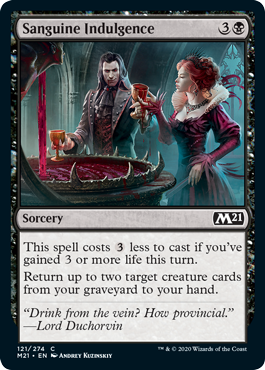
Sanguine Indulgence
{3}{B}
Sorcery
This spell costs {3} less to cast if you've gained 3 or more life this turn.
Return up to two target creature cards from your graveyard to your hand.
- To determine the total cost of a spell, start with the mana cost or alternative cost you're paying, add any cost increases, then apply any cost reductions (such as that of Sanguine Indulgence). The converted mana cost of the spell remains unchanged, no matter what the total cost to cast it was.
- Sanguine Indulgence's first ability looks at how much life you've gained in the turn. It doesn't care if you also lost life, even if you lost more life than you gained.
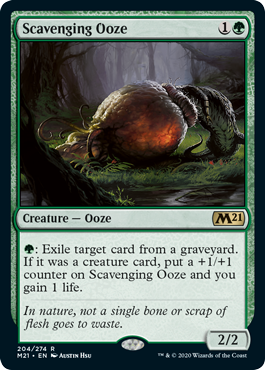
Scavenging Ooze
{1}{G}
Creature — Ooze
2/2
{G}: Exile target card from a graveyard. If it was a creature card, put a +1/+1 counter on Scavenging Ooze and you gain 1 life.
- If the target card is an illegal target when the ability tries to resolve, it won't resolve and none of its effects will happen. No +1/+1 counter will be put on Scavenging Ooze and you won't gain life. Notably, this means that if you activate Scavenging Ooze's ability multiple times targeting the same creature card, only the first instance of the ability to resolve will have any effect.
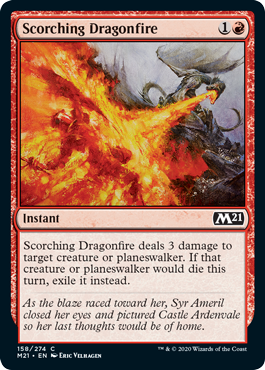
Scorching Dragonfire
{1}{R}
Instant
Scorching Dragonfire deals 3 damage to target creature or planeswalker. If that creature or planeswalker would die this turn, exile it instead.
- Scorching Dragonfire's replacement effect will exile the target creature or planeswalker if it would die this turn for any reason, not just due to lethal damage.
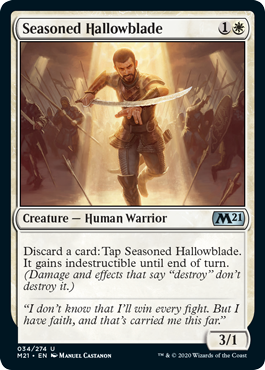
Seasoned Hallowblade
{1}{W}
Creature — Human Warrior
3/1
Discard a card: Tap Seasoned Hallowblade. It gains indestructible until end of turn. (Damage and effects that say "destroy" don't destroy it.)
- You can activate Seasoned Hallowblade's ability even if nothing's about to destroy it, even if it's already tapped, and even if it already has indestructible.
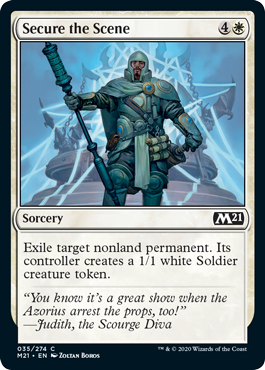
Secure the Scene
{4}{W}
Sorcery
Exile target nonland permanent. Its controller creates a 1/1 white Soldier creature token.
- If the target nonland permanent is an illegal target by the time Secure the Scene tries to resolve, the spell won't resolve. No player will create a Soldier token.
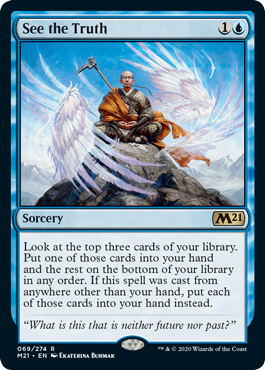
See the Truth
{1}{U}
Sorcery
Look at the top three cards of your library. Put one of those cards into your hand and the rest on the bottom of your library in any order. If this spell was cast from anywhere other than your hand, put each of those cards into your hand instead.
- See the Truth doesn't give you permission to cast it from a zone other than your hand. You'll need to find another way to do so.
- If an effect copies See the Truth while it's on the stack, the copy wasn't cast at all, so you only get one of the cards it has you look at.
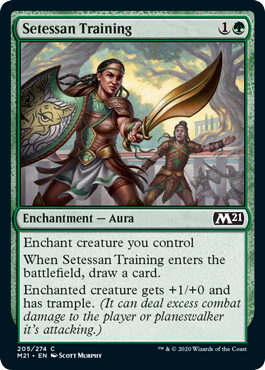
Setessan Training
{1}{G}
Enchantment — Aura
Enchant creature you control
When Setessan Training enters the battlefield, draw a card.
Enchanted creature gets +1/+0 and has trample. (It can deal excess combat damage to the player or planeswalker it's attacking.)
- If the creature Setessan Training would enchant is an illegal target by the time the Aura spell resolves, the entire spell doesn't resolve. It won't enter the battlefield, so its ability won't trigger.
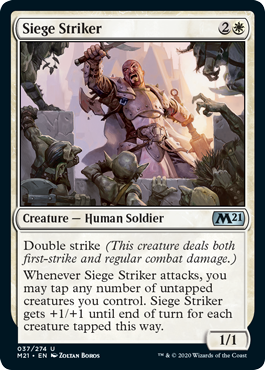
Siege Striker
{2}{W}
Creature — Human Soldier
1/1
Double strike (This creature deals both first-strike and regular combat damage.)
Whenever Siege Striker attacks, you may tap any number of untapped creatures you control. Siege Striker gets +1/+1 until end of turn for each creature tapped this way.
- You choose how many and which creatures to tap while Siege Striker's ability is resolving. No player may take other actions between the time you make this choice and the time Siege Striker's power and toughness are raised.
- If an attacking creature with vigilance is tapped for Siege Striker's ability, that creature remains an attacking creature.
- If Siege Striker gains vigilance and attacks or attacks and becomes untapped before its last ability resolves, it can be tapped for its own ability.
- Once Siege Striker's ability has resolved, it keeps the power-and-toughness bonus even if some of the tapped creatures leave the battlefield or become untapped.
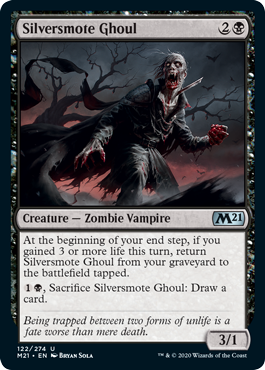
Silversmote Ghoul
{2}{B}
Creature — Zombie Vampire
3/1
At the beginning of your end step, if you gained 3 or more life this turn, return Silversmote Ghoul from your graveyard to the battlefield tapped.
{1}{B}, Sacrifice Silversmote Ghoul: Draw a card.
- Silversmote Ghoul's first ability looks at how much life you've gained in the turn, even if it wasn't on the battlefield or in your graveyard when you gained life. It doesn't care if you also lost life, even if you lost more life than you gained.
- If you haven't gained 3 life by the time your end step begins, Silversmote Ghoul's first ability won't trigger at all.
- If Silversmote Ghoul isn't in your graveyard as your end step begins, its first ability won't trigger at all.
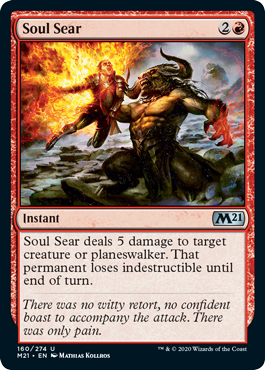
Soul Sear
{2}{R}
Instant
Soul Sear deals 5 damage to target creature or planeswalker. That permanent loses indestructible until end of turn.
- Soul Sear can target a creature or planeswalker that doesn't have indestructible.
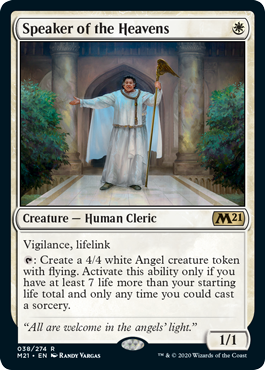
Speaker of the Heavens
{W}
Creature — Human Cleric
1/1
Vigilance, lifelink
{T}: Create a 4/4 white Angel creature token with flying. Activate this ability only if you have at least 7 life more than your starting life total and only any time you could cast a sorcery.
- In a Two-Headed Giant game, you can activate the ability only if your team's life total is at least 7 more than your team's starting life total.
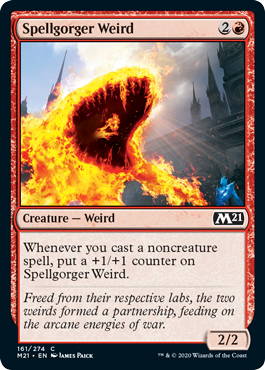
Spellgorger Weird
{2}{R}
Creature — Weird
2/2
Whenever you cast a noncreature spell, put a +1/+1 counter on Spellgorger Weird.
- An ability that triggers when a player casts a spell resolves before the spell that caused it to trigger. It resolves even if that spell is countered.
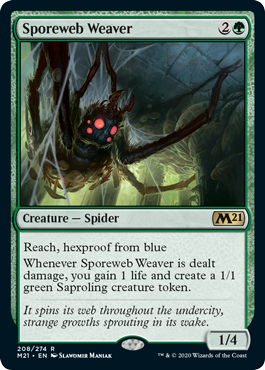
Sporeweb Weaver
{2}{G}
Creature — Spider
1/4
Reach, hexproof from blue
Whenever Sporeweb Weaver is dealt damage, you gain 1 life and create a 1/1 green Saproling creature token.
- Hexproof from blue means that Sporeweb Weaver can't be the target of blue spells your opponents control or abilities your opponents control of blue sources.
- Sporeweb Weaver's last ability triggers just once, no matter how many things deal how much damage to it at once (most likely because two or more creatures blocked it).
- Sporeweb Weaver's last ability triggers even if the damage causes it to die.
- If your life total is brought to 0 or less at the same time that Sporeweb Weaver is dealt damage, you lose the game before the ability goes on the stack.
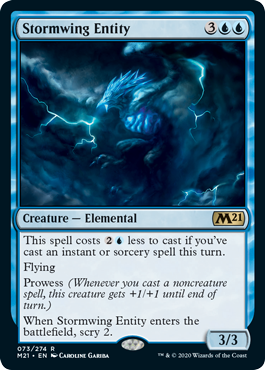
Stormwing Entity
{3}{U}{U}
Creature — Elemental
3/3
This spell costs {2}{U} less to cast if you've cast an instant or sorcery spell this turn.
Flying
Prowess (Whenever you cast a noncreature spell, this creature gets +1/+1 until end of turn.)
When Stormwing Entity enters the battlefield, scry 2.
- To determine the total cost of a spell, start with the mana cost or alternative cost you're paying, add any cost increases, then apply any cost reductions (such as that of Stormwing Entity). The converted mana cost of the spell remains unchanged, no matter what the total cost to cast it was.
- Stormwing Entity's cost reduction applies even if the instant or sorcery spell you cast was countered or didn't resolve.
- Stormwing Entity's cost reduction applies just once, no matter how many instant and sorcery spells you've cast this turn.
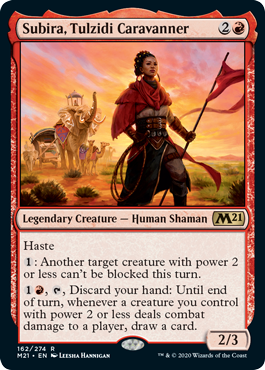
Subira, Tulzidi Caravanner
{2}{R}
Legendary Creature — Human Shaman
2/3
Haste
{1}: Another target creature with power 2 or less can't be blocked this turn.
{1}{R}, {T}, Discard your hand: Until end of turn, whenever a creature you control with power 2 or less deals combat damage to a player, draw a card.
- If the target creature's power is greater than 2 as the first activated ability tries to resolve, the ability doesn't resolve. However, if instead the creature's power is raised above 2 after the ability resolves, it still can't be blocked that turn.
- Once a creature with power 2 or less has been blocked, Subira's middle ability won't cause it to become unblocked.
- You can activate Subira's last ability if your hand is empty. You simply discard zero cards.
- Once Subira's last ability resolves, check to see if the delayed triggered ability should trigger based on the power of the creatures immediately after damage is dealt, not based on their power as the ability resolves.
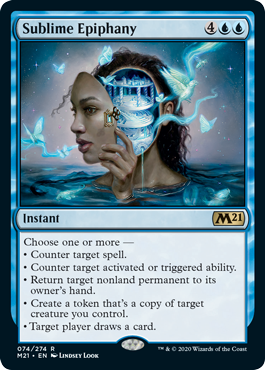
Sublime Epiphany
{4}{U}{U}
Instant
Choose one or more —
• Counter target spell.
• Counter target activated or triggered ability.
• Return target nonland permanent to its owner's hand.
• Create a token that's a copy of target creature you control.
• Target player draws a card.
- You can't choose any one mode more than once.
- If any of the targets become illegal, the remaining targets are affected as appropriate.
- If you choose more than one mode, you perform the modes in the order specified. For example, if you choose to counter target spell, return target nonland permanent to its owner's hand, and have target player draw a card, that permanent will be on the battlefield while that spell is countered (and may modify, affect, or trigger on that event) but will not be on the battlefield while that player draws a card.
- Sublime Epiphany's second mode counters only activated and triggered abilities already on the stack. It doesn't prevent abilities from being activated or from triggering later in the turn, and it has no effect on static abilities.
- Activated abilities are written in the form "[Cost]: [Effect]." Some keyword abilities (such as equip) are activated abilities and will have colons in their reminder texts.
- Triggered abilities use the word "when," "whenever," or "at." They're often written as "[Trigger condition], [effect]." Some keyword abilities (such as prowess) are triggered abilities and will have "when," "whenever," or "at" in their reminder text.
- Abilities that create replacement effects, such as a permanent entering the battlefield tapped or with counters on it, can't be countered. Abilities that apply "as [this creature] enters the battlefield" are also replacement effects and can't be countered.
- Sublime Epiphany's second mode can't counter an activated or triggered mana ability. An activated mana ability is one that adds mana to a player's mana pool as it resolves, doesn't have a target, and isn't a loyalty ability. A triggered mana ability is one that adds mana to a player's mana pool and triggers on an activated mana ability.
- If you counter a delayed triggered ability that triggered at the beginning of the "next" occurrence of a specified step or phase, that ability won't trigger again the following time that phase or step occurs.
- If you choose the third and fourth modes and target the same creature you control both times, you'll return it and then create a token that's a copy of it, using its copiable values as it last appeared on the battlefield. This is because the legality of targets is checked only as the spell begins to resolve, before any actions are performed.
- The token copies exactly what is printed on the creature and nothing else (unless that creature is a token or is copying something else; see below). It doesn't copy whether that creature is tapped or untapped, whether it has any counters on it or Auras and/or Equipment attached to it, or any non-copy effects that changed its power, toughness, types, color, and so on.
- If the copied creature is itself a token, the token created by Sublime Epiphany copies the original characteristics of that token as stated by the effect that created it.
- If the copied creature is copying something else, the token enters the battlefield as whatever that creature is copying.
- If the copied creature has {X} in its mana cost, X is 0.
- Any enters-the-battlefield abilities of the copied creature will trigger when the token enters the battlefield. Any "As [this creature] enters the battlefield" or "[This creature] enters the battlefield with" abilities of the copied creature will also work.
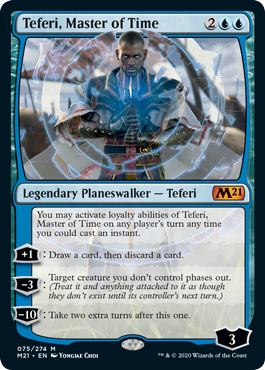
Teferi, Master of Time
{2}{U}{U}
Legendary Planeswalker — Teferi
3
You may activate loyalty abilities of Teferi, Master of Time on any player's turn any time you could cast an instant.
+1: Draw a card, then discard a card.
−3: Target creature you don't control phases out. (Treat it and anything attached to it as though they don't exist until its controller's next turn.)
−10: Take two extra turns after this one.
- Teferi's first ability doesn't change how many of his abilities you can activate during each turn.
- You draw a card and discard a card all while Teferi's first loyalty ability is resolving. Nothing can happen between the two, and no player may choose to take actions.
- While a permanent is phased out, it's treated as though it doesn't exist. It can't be the target of spells or abilities, its static abilities have no effect on the game, its triggered abilities can't trigger, it can't attack or block, and so on.
- An attacking creature that phases out is removed from combat.
- Phasing out doesn't cause any "leaves the battlefield" abilities to trigger. Similarly, phasing in won't cause any "enters the battlefield" abilities to trigger.
- Any one-shot effects that are waiting "until [this] leaves the battlefield," such as that of Kitesail Freebooter, won't happen when a permanent phases out.
- Any continuous effects with a "for as long as" duration such as that of Awakener Druid ignore phased-out objects. Any such effects will expire if their conditions are no longer met after ignoring the phased-out objects.
- Each Aura and Equipment attached to a permanent that's phasing out also phases out. They will phase in with that permanent and still be attached to it. Similarly, permanents that phase out with counters phase in with those counters.
- Choices made for permanents as they entered the battlefield are remembered when they phase in.
- Any creatures that phase in during their controller's untap step will be able to attack and pay a cost of {T} during that turn.
- If an opponent gains control of your creature and it phases out and the duration of the control-change effect expires before it phases in, that permanent phases in under your control as that opponent's next untap step begins. If they leave the game before their next untap step, it phases in as the next untap step begins after their turn would have begun.
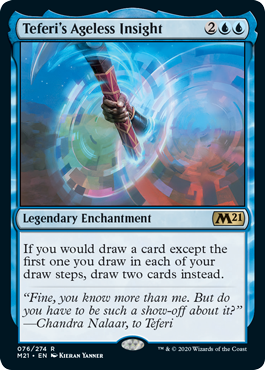
Teferi's Ageless Insight
{2}{U}{U}
Legendary Enchantment
If you would draw a card except the first one you draw in each of your draw steps, draw two cards instead.
- If a spell or ability causes you to put a card into your hand without specifically using the word "draw," it's not a card drawn.
- If two or more replacement effects would apply to a card-drawing event, the player drawing the card chooses the order in which to apply them.
- Because Teferi's Ageless Insight is legendary, it's unlikely that one player will control two. However, if that happens, each card that player would draw after the first will result in four cards being drawn. If they control three, they draw eight cards, and so on.
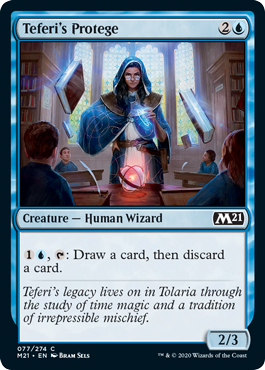
Teferi's Protege
{2}{U}
Creature — Human Wizard
2/3
{1}{U}, {T}: Draw a card, then discard a card.
- You draw a card and discard a card all while the ability is resolving. Nothing can happen between the two, and no player may choose to take actions.

Teferi's Tutelage
{2}{U}
Enchantment
When Teferi's Tutelage enters the battlefield, draw a card, then discard a card.
Whenever you draw a card, target opponent mills two cards. (They put the top two cards of their library into their graveyard.)
- You draw a card and discard a card all while the first ability is resolving. Nothing can happen between the two, and no player may choose to take actions. This means that the second ability is put onto the stack after you've finished resolving the first ability.
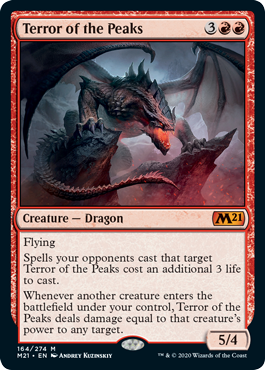
Terror of the Peaks
{3}{R}{R}
Creature — Dragon
5/4
Flying
Spells your opponents cast that target Terror of the Peaks cost an additional 3 life to cast.
Whenever another creature enters the battlefield under your control, Terror of the Peaks deals damage equal to that creature's power to any target.
- The amount of damage Terror of the Peaks deals is the entering creature's power as the triggered ability resolves. If that creature leaves the battlefield before the ability resolves, use its power as it last existed on the battlefield.
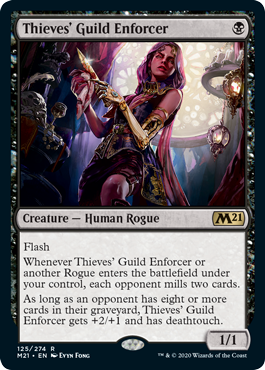
Thieves' Guild Enforcer
{B}
Creature — Human Rogue
1/1
Flash
Whenever Thieves' Guild Enforcer or another Rogue enters the battlefield under your control, each opponent mills two cards.
As long as an opponent has eight or more cards in their graveyard, Thieves' Guild Enforcer gets +2/+1 and has deathtouch.
- Thieves' Guild Enforcer gets +2/+1 just once, no matter how many opponents have eight or more cards in their graveyard and no matter how many cards they have past the eighth.
- If Thieves' Guild Enforcer gains deathtouch only after dealing damage (most likely because another creature was dealt lethal damage at the same time that Thieves' Guild Enforcer dealt damage), the damage it dealt won't be from a source with deathtouch.
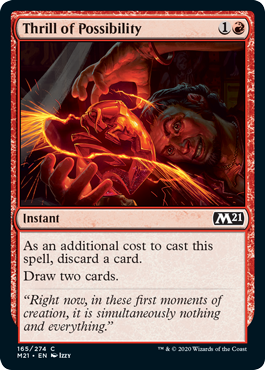
Thrill of Possibility
{1}{R}
Instant
As an additional cost to cast this spell, discard a card.
Draw two cards.
- You must discard exactly one card to cast Thrill of Possibility; you can't cast it without discarding a card, and you can't discard additional cards.
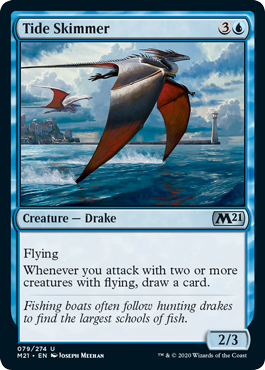
Tide Skimmer
{3}{U}
Creature — Drake
2/3
Flying
Whenever you attack with two or more creatures with flying, draw a card.
- Tide Skimmer's ability triggers just once, no matter how many creatures with flying attack beyond the second.
- You draw a card even if some or all of the attacking creatures lose flying or leave combat before Tide Skimmer's ability resolves.
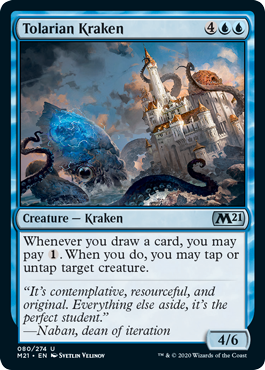
Tolarian Kraken
{4}{U}{U}
Creature — Kraken
4/6
Whenever you draw a card, you may pay {1}. When you do, you may tap or untap target creature.
- While resolving Tolarian Kraken's ability, you can't pay more than {1} to tap or untap more than one creature.
- If a spell or ability causes you to put a card into your hand without specifically using the word "draw," it's not a card drawn.
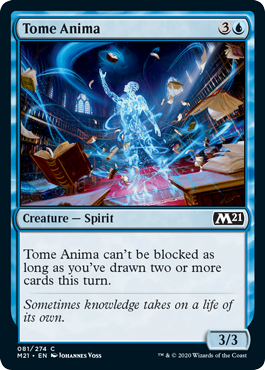
Tome Anima
{3}{U}
Creature — Spirit
3/3
Tome Anima can't be blocked as long as you've drawn two or more cards this turn.
- Once Tome Anima has become blocked, it won't become unblocked if you draw a second card.
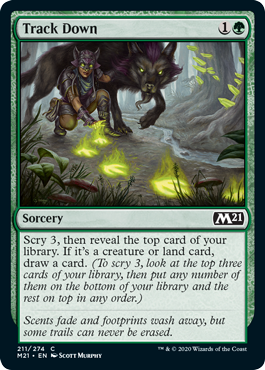
Track Down
{1}{G}
Sorcery
Scry 3, then reveal the top card of your library. If it's a creature or land card, draw a card. (To scry 3, look at the top three cards of your library, then put any number of them on the bottom of your library and the rest on top in any order.)
- The card you reveal will be the card you draw, if applicable.
- If you don't draw the card you reveal, it remains on top of your library.
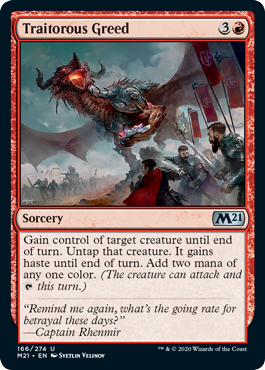
Traitorous Greed
{3}{R}
Sorcery
Gain control of target creature until end of turn. Untap that creature. It gains haste until end of turn. Add two mana of any one color. (The creature can attack and {T} this turn.)
- Traitorous Greed can target any creature, even one that's untapped or one you already control.
- Gaining control of a creature doesn't cause you to gain control of any Auras or Equipment attached to it.
- If the target creature is an illegal target by the time Traitorous Greed tries to resolve, the spell won't resolve. You won't add two mana.
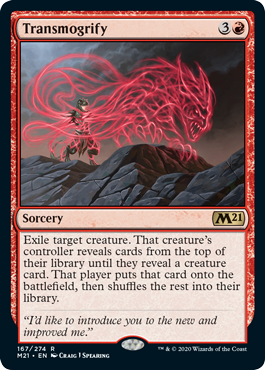
Transmogrify
{3}{R}
Sorcery
Exile target creature. That creature's controller reveals cards from the top of their library until they reveal a creature card. That player puts that card onto the battlefield, then shuffles the rest into their library.
- If the target creature is an illegal target by the time Transmogrify tries to resolve, the spell won't resolve. No player reveals cards or shuffles their library.
- If the player reveals their entire library without revealing a creature card, that player just shuffles their library.
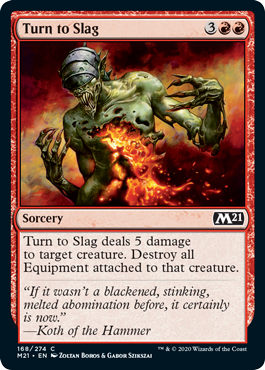
Turn to Slag
{3}{R}{R}
Sorcery
Turn to Slag deals 5 damage to target creature. Destroy all Equipment attached to that creature.
- Turn to Slag can target a creature that has no Equipment attached to it.
- If the target creature is an illegal target by the time Turn to Slag tries to resolve, the spell won't resolve. You won't destroy any Equipment.
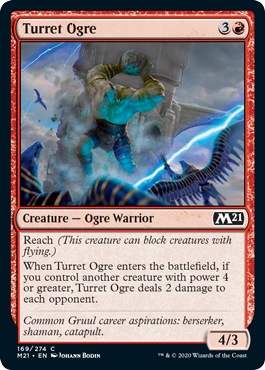
Turret Ogre
{3}{R}
Creature — Ogre Warrior
4/3
Reach (This creature can block creatures with flying.)
When Turret Ogre enters the battlefield, if you control another creature with power 4 or greater, Turret Ogre deals 2 damage to each opponent.
- If you don't control another creature with power 4 or greater immediately after Turret Ogre enters the battlefield, its ability doesn't trigger, even if you can raise a creature's power right away. If you control no other creature with power 4 or greater as the ability resolves, nothing happens. These don't have to be the same creature, though.
- Turret Ogre's ability doesn't deal more than 2 damage to each opponent if you control more than one other creature with power 4 or greater.
- In a Two-Headed Giant game, Turret Ogre's ability causes the opposing team to lose 4 life.
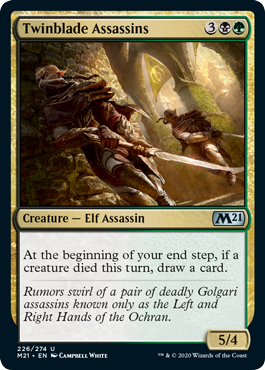
Twinblade Assassins
{3}{B}{G}
Creature — Elf Assassin
5/4
At the beginning of your end step, if a creature died this turn, draw a card.
- If a creature didn't die before your end step begins, the ability of Twinblade Assassins doesn't trigger at all. The creature may have died before Twinblade Assassins entered the battlefield, however.
- The triggered ability triggers just once, no matter how many creatures died this turn.
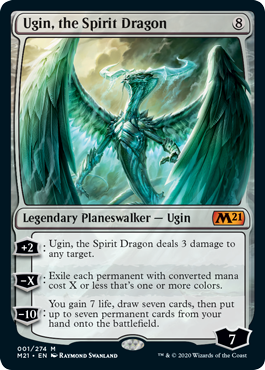
Ugin, the Spirit Dragon
{8}
Legendary Planeswalker — Ugin
7
+2: Ugin, the Spirit Dragon deals 3 damage to any target.
−X: Exile each permanent with converted mana cost X or less that's one or more colors.
−10: You gain 7 life, draw seven cards, then put up to seven permanent cards from your hand onto the battlefield.
- If a permanent has {X} in its mana cost, X is considered to be 0.
- The converted mana cost of a token that isn't a copy of another object is 0. A token that is a copy of another object has the same mana cost as that object.
- A permanent card is an artifact, creature, enchantment, land, or planeswalker card.
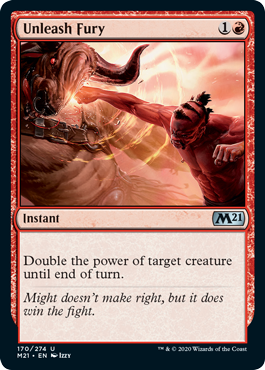
Unleash Fury
{1}{R}
Instant
Double the power of target creature until end of turn.
- If an effect instructs you to "double" a creature's power, that creature gets +X/+0, where X is its power as that effect begins to apply. If its power is negative, instead it gets -X/-0 where X is how far below 0 its power is. The value of X won't change if another effect alters the creature's power later in the turn.
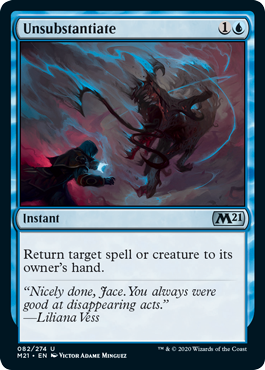
Unsubstantiate
{1}{U}
Instant
Return target spell or creature to its owner's hand.
- If a spell is returned to its owner's hand, it's removed from the stack and thus will not resolve. The spell isn't countered; it just no longer exists. This works against a spell that can't be countered.
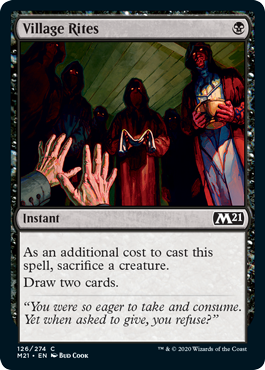
Village Rites
{B}
Instant
As an additional cost to cast this spell, sacrifice a creature.
Draw two cards.
- You must sacrifice exactly one creature to cast this spell; you can't cast it without sacrificing a creature, and you can't sacrifice additional creatures.
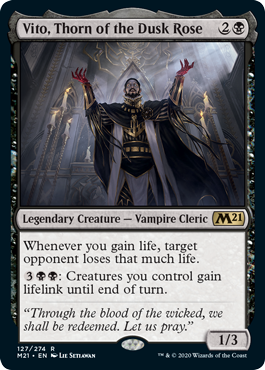
Vito, Thorn of the Dusk Rose
{2}{B}
Legendary Creature — Vampire Cleric
1/3
Whenever you gain life, target opponent loses that much life.
{3}{B}{B}: Creatures you control gain lifelink until end of turn.
- Because Vito's first ability doesn't deal damage, you won't gain life when it resolves if Vito has lifelink.
- If an ability triggers whenever an opponent loses life and causes you to gain life, such as the ability of Exquisite Blood, this will loop until either you win the game or a player takes an action to break the loop.
- Each creature with lifelink dealing combat damage causes a separate life-gaining event. For example, if two creatures you control with lifelink deal combat damage at the same time, Vito's first ability will trigger twice and you may choose a different opponent for each trigger. However, if a single creature you control with lifelink deals combat damage to multiple creatures, players, and/or planeswalkers at the same time (perhaps because it has trample or was blocked by more than one creature), the ability will trigger only once.
- If you gain an amount of life "for each" of something, that life is gained as one event and Vito's first ability triggers only once.
- In a Two-Headed Giant game, life gained by your teammate won't cause the ability to trigger, even though it caused your team's life total to increase.
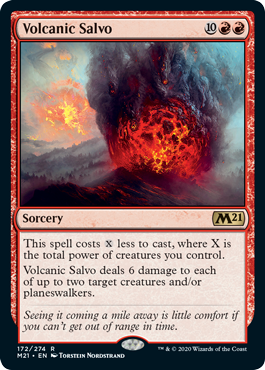
Volcanic Salvo
{10}{R}{R}
Sorcery
This spell costs {X} less to cast, where X is the total power of creatures you control.
Volcanic Salvo deals 6 damage to each of up to two target creatures and/or planeswalkers.
- To determine the total cost of a spell, start with the mana cost or alternative cost you're paying, add any cost increases, then apply any cost reductions (such as that of Volcanic Salvo). The converted mana cost of the spell remains unchanged, no matter what the total cost to cast it was.
- The cost reduction applies only to generic mana in the cost of Volcanic Salvo. It can't reduce the {R}{R} requirement.
- Once you begin to cast Volcanic Salvo, players can't take other actions until you've finished casting it. Notably, they can't try to change the total power of your creatures.
- The total cost to cast Volcanic Salvo is locked in before you pay that cost. For example, if you control three 2/2 creatures, including one you can sacrifice to add {C} to your mana pool, the total cost is {4}{R}{R}. Then you can sacrifice the creature when you activate mana abilities just before paying the cost.
- If a creature's power is somehow less than 0, it subtracts from the total power of your other creatures. If the total power of your creatures is 0 or less, the cost remains {10}{R}{R}.
- You can't target the same creature or planeswalker twice with Volcanic Salvo to deal 12 damage to it.
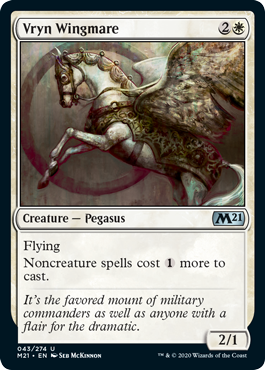
Vryn Wingmare
{2}{W}
Creature — Pegasus
2/1
Flying
Noncreature spells cost {1} more to cast.
- The ability affects each spell that's not a creature spell, including your own. Creature spells with another type, such as artifact creature spells, aren't affected.
- To determine the total cost of a spell, start with the mana cost or alternative cost you're paying, add any cost increases (such as that of Vryn Wingmare), then apply any cost reductions. The converted mana cost of the spell remains unchanged, no matter what the total cost to cast it was.
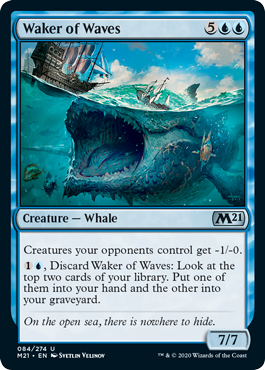
Waker of Waves
{5}{U}{U}
Creature — Whale
7/7
Creatures your opponents control get -1/-0.
{1}{U}, Discard Waker of Waves: Look at the top two cards of your library. Put one of them into your hand and the other into your graveyard.
- You can activate the last ability of Waker of Waves only if it's in your hand.
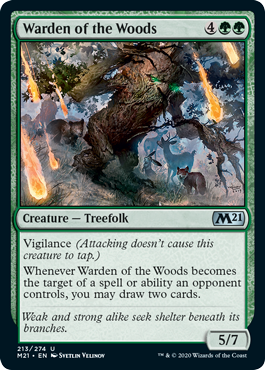
Warden of the Woods
{4}{G}{G}
Creature — Treefolk
5/7
Vigilance (Attacking doesn't cause this creature to tap.)
Whenever Warden of the Woods becomes the target of a spell or ability an opponent controls, you may draw two cards.
- An ability that triggers when something becomes the target of a spell or ability resolves before the spell or ability that caused it to trigger. It resolves even if that spell or ability is countered.
- Players can cast spells and activate abilities after the triggered ability resolves but before the spell that caused it to trigger does.
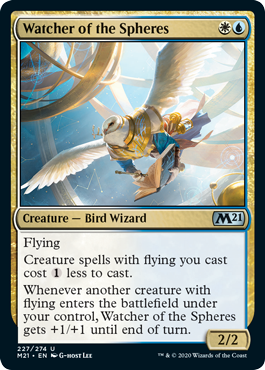
Watcher of the Spheres
{W}{U}
Creature — Bird Wizard
2/2
Flying
Creature spells with flying you cast cost {1} less to cast.
Whenever another creature with flying enters the battlefield under your control, Watcher of the Spheres gets +1/+1 until end of turn.
- To determine the total cost of a spell, start with the mana cost or alternative cost you're paying, add any cost increases, then apply any cost reductions (such as that of Watcher of the Spheres). The converted mana cost of the spell remains unchanged, no matter what the total cost to cast it was.
- The cost reduction applies only to generic mana in the cost of creature spells with flying you cast. For example, if you cast a second Watcher of the Spheres, its cost won't be reduced below {W}{U}.
- A creature spell that doesn't have flying won't cost less even if an effect will cause the creature to have flying once on the battlefield. This is also true if the creature spell itself has an ability that gives it flying once on the battlefield under certain conditions, even if those conditions are true.
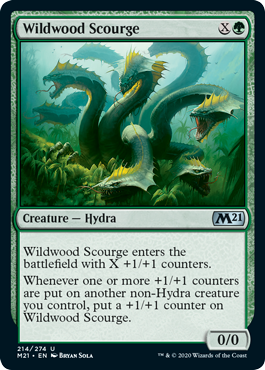
Wildwood Scourge
{X}{G}
Creature — Hydra
0/0
Wildwood Scourge enters the battlefield with X +1/+1 counters on it.
Whenever one or more +1/+1 counters are put on another non-Hydra creature you control, put a +1/+1 counter on Wildwood Scourge.
- Abilities that trigger when counters are put on a creature trigger when a creature enters the battlefield with counters and when a player puts counters on a creature.
- Wildwood Scourge gets just one +1/+1 counter, no matter how many counters were put on the non-Hydra creature.
- If you have two non-Hydra creatures with Wildwood Scourge's ability (perhaps because they were mutated using the Ikoria: Lair of Behemoths mutate ability), putting a +1/+1 counter on any non-Hydra creature you control will cause the two abilities to trigger each other indefinitely. If no player takes an action to break this loop, the game ends in a draw.
BUY-A-BOX PROMO CARD-SPECIFIC NOTES
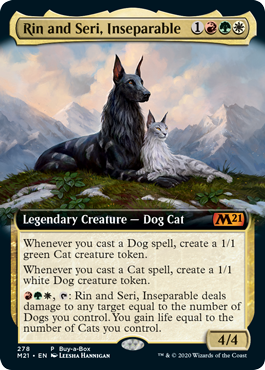
Rin and Seri, Inseparable
{1}{R}{G}{W}
Legendary Creature —Dog Cat
4/4
Whenever you cast a Dog spell, create a 1/1 green Cat creature token.
Whenever you cast a Cat spell, create a 1/1 white Dog creature token.
{R}{G}{W}, {T}: Rin and Seri, Inseparable deals damage to any target equal to the number of Dogs you control. You gain life equal to the number of Cats you control.
- Rin and Seri's first two abilities don't trigger when you cast Rin and Seri.
- An ability that triggers when a player casts a spell resolves before the spell that caused it to trigger. It resolves even if that spell is countered.
- If the chosen target is an illegal target by the time Rin and Seri's last ability tries to resolve, the ability won't resolve. You won't gain life.
- The amount of damage Rin and Seri's last ability deals is determined only as that ability resolves. If Rin and Seri is still on the battlefield, it'll count itself.
PLANESWALKER DECK CARD-SPECIFIC NOTES
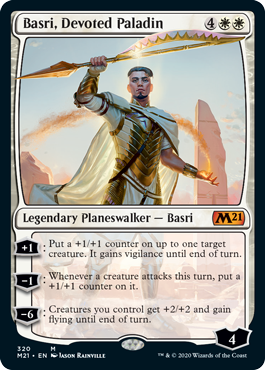
Basri, Devoted Paladin
{4}{W}{W}
Legendary Planeswalker — Basri
4
+1: Put a +1/+1 counter on up to one target creature. It gains vigilance until end of turn.
−1: Whenever a creature attacks this turn, put a +1/+1 counter on it.
−6: Creatures you control get +2/+2 and gain flying until end of turn.
- After activating Basri's second ability, a creature that attacks gets a +1/+1 counter before blockers are chosen.
- Basri's last ability affects only creatures you control at the time it resolves. Creatures you begin to control later in the turn won't get +2/+2 or gain flying.
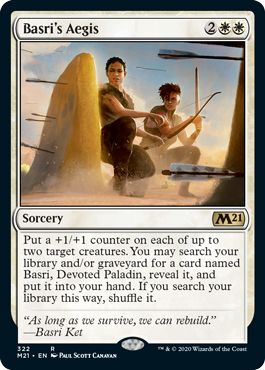
Basri's Aegis
{2}{W}{W}
Sorcery
Put a +1/+1 counter on each of up to two target creatures. You may search your library and/or graveyard for a card named Basri, Devoted Paladin, reveal it, and put it into your hand. If you search your library this way, shuffle it.
- You can cast Basri's Aegis without any target creatures. You'll just search for Basri, Devoted Paladin.
- If do you choose targets and each target creature is an illegal target by the time Basri's Aegis tries to resolve, the spell won't resolve. You won't search for Basri. If just one target is still legal, however, you do put a +1/+1 counter on it and search for Basri.
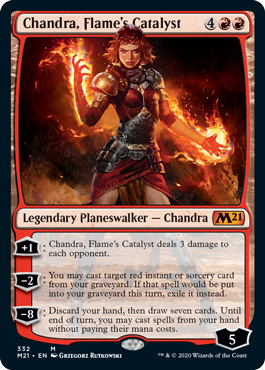
Chandra, Flame's Catalyst
{4}{R}{R}
Legendary Planeswalker — Chandra
5
+1: Chandra, Flame's Catalyst deals 3 damage to each opponent.
−2: You may cast target red instant or sorcery card from your graveyard. If that spell would be put into your graveyard this turn, exile it instead.
−8: Discard your hand, then draw seven cards. Until end of turn, you may cast spells from your hand without paying their mana costs.
- You must pay the costs for the spell you wish to cast with Chandra's second ability. If that spell has any alternative costs, you may pay those.
- If you wish to cast the target card, you must cast it while Chandra's second ability is resolving. You can't cast it later in the turn.
- If you have no cards in hand while Chandra's last ability is resolving, you still draw seven cards and may cast spells from your hand without paying their mana costs this turn.
- Chandra's last ability doesn't change when you may cast those spells. For example, you can't cast a sorcery spell from your hand during combat.
- If you cast a spell "without paying its mana cost," you can't choose to cast it for any alternative costs. You can, however, pay additional costs. If the card has any mandatory additional costs, those must be paid to cast the spell.
- If a spell has {X} in its mana cost, you must choose 0 as the value of X when casting it without paying its mana cost.
- In a Two-Headed Giant game, Chandra's first ability causes the opposing team to lose 6 life.
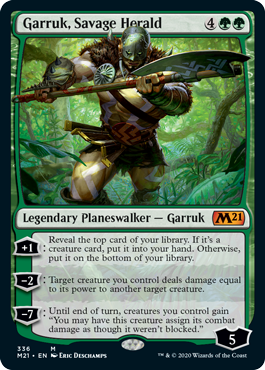
Garruk, Savage Herald
{4}{G}{G}
Legendary Planeswalker — Garruk
5
+1: Reveal the top card of your library. If it's a creature card, put it into your hand. Otherwise, put it on the bottom of your library.
−2: Target creature you control deals damage equal to its power to another target creature.
−7: Until end of turn, creatures you control gain "You may have this creature assign its combat damage as though it weren't blocked."
- If either creature is an illegal target as Garruk's second ability tries to resolve, the creature you control won't deal damage to any creature.
- When assigning combat damage, you choose for each creature whether you want to assign its damage to the creature blocking it, or if you want to assign it to the player or planeswalker the creature is attacking. You can't split the damage assignment between them.
- Garruk's last ability affects only creatures you control at the time it resolves. Creatures you begin to control later in the turn won't gain the ability.
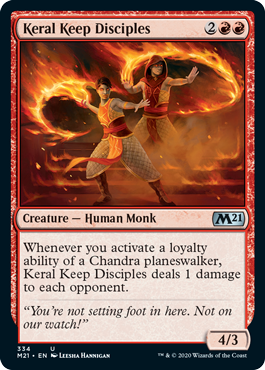
Keral Keep Disciples
{2}{R}{R}
Creature — Human Monk
4/3
Whenever you activate a loyalty ability of a Chandra planeswalker, Keral Keep Disciples deals 1 damage to each opponent.
- The ability of Keral Keep Disciples resolves before the ability that caused it to trigger.
- In a Two-Headed Giant game, the ability of Keral Keep Disciples causes the opposing team to lose 2 life.
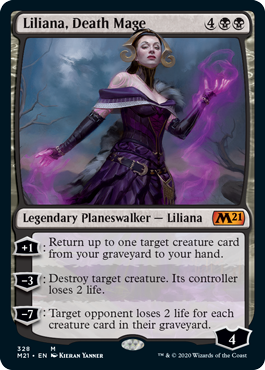
Liliana, Death Mage
{4}{B}{B}
Legendary Planeswalker — Liliana
4
+1: Return up to one target creature card from your graveyard to your hand.
−3: Destroy target creature. Its controller loses 2 life.
−7: Target opponent loses 2 life for each creature card in their graveyard.
- If the target creature is an illegal target by the time Liliana's second ability tries to resolve, the ability won't resolve. No player loses 2 life. If the target is legal but not destroyed (most likely because it has indestructible), its controller does lose 2 life.
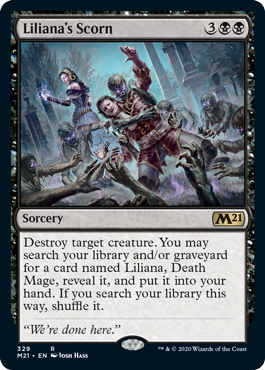
Liliana's Scorn
{3}{B}{B}
Sorcery
Destroy target creature. You may search your library and/or graveyard for a card named Liliana, Death Mage, reveal it, and put it into your hand. If you search your library this way, shuffle it.
- If the target creature is an illegal target by the time Liliana's Scorn tries to resolve, the spell won't resolve. You won't search for Liliana, Death Mage. If the target is legal but not destroyed (most likely because it has indestructible), you do search for Liliana.
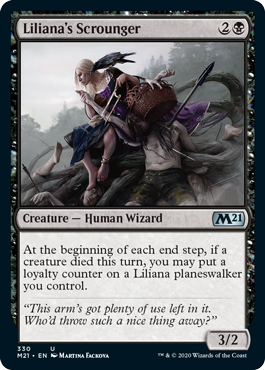
Liliana's Scrounger
{2}{B}
Creature — Human Wizard
3/2
At the beginning of each end step, if a creature died this turn, you may put a loyalty counter on a Liliana planeswalker you control.
- If a creature didn't die before your end step begins, the ability of Liliana's Scrounger doesn't trigger at all. The creature may have died before Liliana's Scrounger entered the battlefield, however.
- The triggered ability triggers just once, no matter how many creatures died this turn.
- If you control more than one Liliana planeswalker, you choose which one receives a loyalty counter as the ability of Liliana's Scrounger resolves.
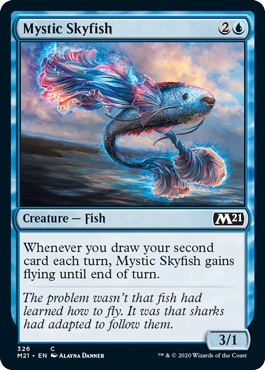
Mystic Skyfish
{2}{U}
Creature — Fish
3/1
Whenever you draw your second card each turn, Mystic Skyfish gains flying until end of turn.
- The triggered ability can trigger only once each turn. It doesn't matter Mystic Skyfish was on the battlefield when the first card was drawn. If it's not on the battlefield when the second card is drawn, the ability can't trigger at all that turn. It won't trigger when the third or fourth card is drawn.
- If a spell or ability causes you to put a card into your hand without specifically using the word "draw," it's not a card drawn.
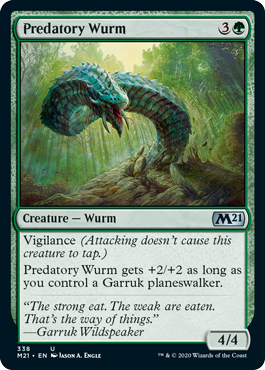
Predatory Wurm
{3}{G}
Creature — Wurm
4/4
Vigilance (Attacking doesn't cause this creature to tap.)
Predatory Wurm gets +2/+2 as long as you control a Garruk planeswalker.
- Because damage remains marked on a creature until the damage is removed as the turn ends, nonlethal damage dealt to Predatory Wurm may become lethal if you controlled a Garruk planeswalker and he leaves the battlefield during that turn.
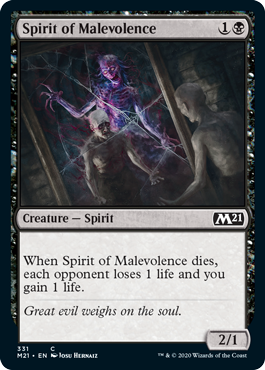
Spirit of Malevolence
{1}{B}
Creature — Spirit
2/1
When Spirit of Malevolence dies, each opponent loses 1 life and you gain 1 life.
- If your life total is brought to 0 or less at the same time that Spirit of Malevolence is dealt lethal damage, you lose the game before its ability goes on the stack.
- In a Two-Headed Giant game, Spirit of Malevolence's ability causes the opposing team to lose 2 life and you to gain 1 life.
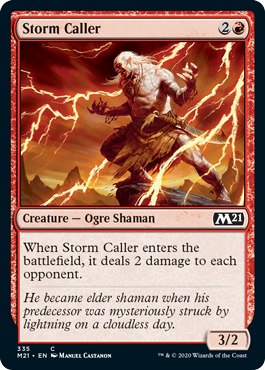
Storm Caller
{2}{R}
Creature — Ogre Shaman
3/2
When Storm Caller enters the battlefield, it deals 2 damage to each opponent.
- In a Two-Headed Giant game, Storm Caller's ability causes the opposing team to lose 4 life.
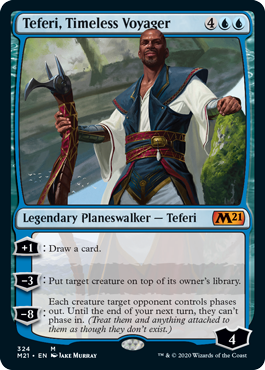
Teferi, Timeless Voyager
{4}{U}{U}
Legendary Planeswalker — Teferi
4
+1: Draw a card.
−3: Put target creature on top of its owner's library.
−8: Each creature target opponent controls phases out. Until the end of your next turn, they can't phase in. (Treat them and anything attached to them as though they don't exist.)
- Normally, phased-out permanents phase in during their controller's untap step. Teferi's last ability causes the phased-out permanents to not phase in until the duration has expired; they'll phase in during their controller's next untap step after your next turn.
- While a permanent is phased out, it's treated as though it doesn't exist. It can't be the target of spells or abilities, its static abilities have no effect on the game, its triggered abilities can't trigger, it can't attack or block, and so on.
- An attacking creature that phases out is removed from combat.
- Phasing out doesn't cause any "leaves the battlefield" abilities to trigger. Similarly, phasing in won't cause any "enters the battlefield" abilities to trigger.
- Any one-shot effects that are waiting "until [this] leaves the battlefield," such as that of Kitesail Freebooter, won't happen when a permanent phases out.
- Any continuous effects with a "for as long as" duration such as that of Awakener Druid ignore phased-out objects. Any such effects will expire if their conditions are no longer met after ignoring the phased-out objects.
- Each Aura and Equipment attached to a permanent that's phasing out also phases out. They will phase in with that permanent and still be attached to it. Similarly, permanents that phase out with counters phase in with those counters.
- Choices made for permanents as they entered the battlefield are remembered when they phase in.
- Any creatures that phase in during their controller's untap step will be able to attack and pay a cost of {T} during that turn.
- If an opponent gains control of your creature and it phases out and the duration of the control-change effect expires before it phases in, that permanent phases in under your control as that opponent's appropriate untap step begins. If they leave the game before that untap step, it phases in as the next untap step begins after that turn would have begun.
- In a multiplayer game, if you leave the game after Teferi's last ability resolves but before your next turn ends, its effect lasts until your next turn would have begun. It neither expires immediately nor lasts indefinitely.
JUMPSTART CARD-SPECIFIC NOTES
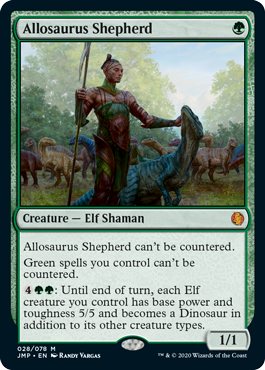
Allosaurus Shepherd
{G}
Creature — Elf Shaman
1/1
Allosaurus Shepherd can't be countered.
Green spells you control can't be countered.
{4}{G}{G}: Until end of turn, each Elf creature you control has base power and toughness 5/5 and becomes a Dinosaur in addition to its other creature types.
- A spell or ability that counters spells can still target spells that can't be countered. When that spell or ability resolves, the uncounterable spell won't be countered, but any additional effects of the countering spell or ability will still happen.
- Allosaurus Shepherd's last ability overwrites all previous effects that set the affected creatures' power and/or toughness to specific values. Other effects that set these characteristics to specific values that start to apply after the ability resolves will overwrite that part of the effect.
- Effects that modify an affected creature's power or toughness without setting it will apply no matter when they started to take effect. The same is true for counters that change the creature's power or toughness.
- The affected creatures don't lose any abilities when they become Dinosaurs.
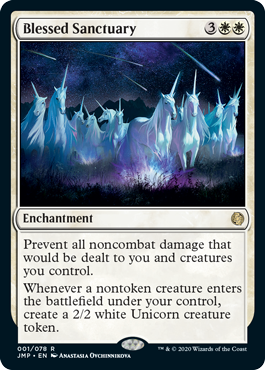
Blessed Sanctuary
{3}{W}{W}
Enchantment
Prevent all noncombat damage that would be dealt to you and creatures you control.
Whenever a nontoken creature enters the battlefield under your control, create a 2/2 white Unicorn creature token.
- Combat damage is the damage that's dealt automatically by attacking and blocking creatures. Any other damage is noncombat damage, even if it's dealt during a combat phase by an attacking or blocking creature.
- Effects that cause you to lose life aren't prevented.
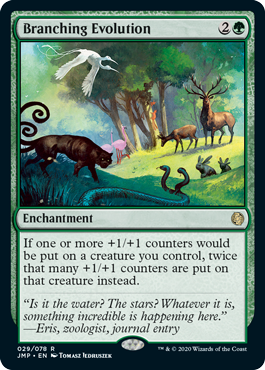
Branching Evolution
{2}{G}
Enchantment
If one or more +1/+1 counters would be put on a creature you control, twice that many +1/+1 counters are put on that creature instead.
- If a creature you control would enter the battlefield with a number of +1/+1 counters on it, it enters with twice that many instead.
- If you control two Branching Evolutions, the number of +1/+1 counters put on a creature is four times the original number. Three Branching Evolutions multiplies the original number by eight, and so on.
- If two or more effects attempt to modify how many counters would be put onto a creature you control, you choose the order to apply those effects, no matter who controls the sources of those effects.
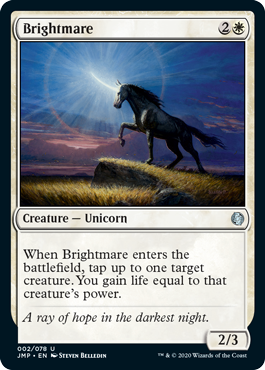
Brightmare
{2}{W}
Creature — Unicorn
2/3
When Brightmare enters the battlefield, tap up to one target creature. You gain life equal to that creature's power.
- If the target creature is an illegal target by the time Brightmare's ability tries to resolve, the ability won't resolve. You won't gain any life.
- Brightmare's ability can target a tapped creature. If the target creature is already tapped when the ability resolves, that creature just remains tapped and you gain life equal to its power.
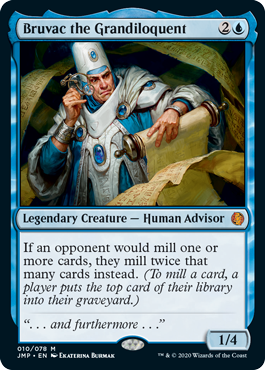
Bruvac the Grandiloquent
{2}{U}
Legendary Creature — Human Advisor
1/4
If an opponent would mill one or more cards, they mill twice that many cards instead. (To mill a card, a player puts the top card of their library into their graveyard.)
- If a player is instructed to put a card into their graveyard without using the word "mill," Bruvac's ability doesn't apply.
- Many cards printed before the Core Set 2021 release have received errata to instruct a player to mill cards rather than to put the top cards of their library into their graveyard. Use the Oracle card reference at Gatherer.Wizards.com to determine whether a specific card has received such errata. As a rule of thumb, if an effect instructs a player to look at or reveal a card before it's put into its owner's graveyard, it's unlikely to have received errata.
- Because Bruvac is legendary, it's unlikely that one player will control two. However, if that happens, each opponent mills four times as many cards as originally instructed. If they control three, their opponents mill eight times as many, and so on.
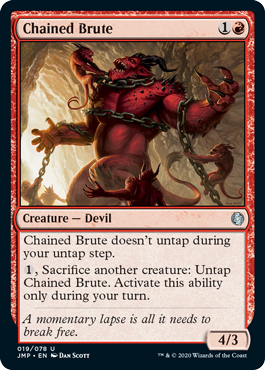
Chained Brute
{1}{R}
Creature — Devil
4/3
Chained Brute doesn't untap during your untap step.
{1}, Sacrifice another creature: Untap Chained Brute. Activate this ability only during your turn.
- You can activate Chained Brute's last ability even if it's already untapped.
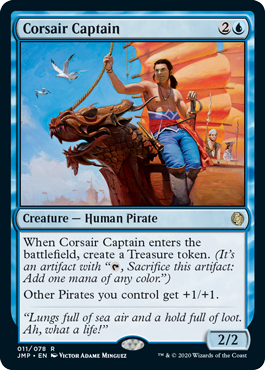
Corsair Captain
{2}{U}
Creature — Human Pirate
2/2
When Corsair Captain enters the battlefield, create a Treasure token. (It's an artifact with "{T}, Sacrifice this artifact: Add one mana of any color.")
Other Pirates you control get +1/+1.
- Because damage remains marked on a creature until the damage is removed as the turn ends, nonlethal damage dealt to Pirates you control may become lethal if Corsair Captain leaves the battlefield during that turn.
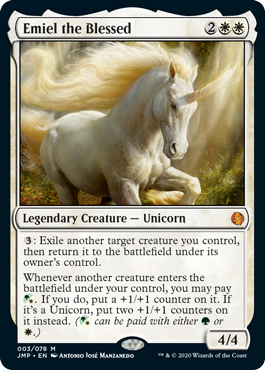
Emiel the Blessed
{2}{W}{W}
Legendary Creature — Unicorn
4/4
{3}: Exile another target creature you control, then return it to the battlefield under its owner's control.
Whenever another creature enters the battlefield under your control, you may pay {g/w}. If you do, put a +1/+1 counter on it. If it's a Unicorn, put two +1/+1 counters on it instead. ({g/w} can be paid with either {G} or {W}.)
- When the card returns to the battlefield, it will be a new object with no connection to the card that was exiled. Auras attached to the exiled creature will be put into their owners' graveyards. Any Equipment will become unattached and remain on the battlefield. Any counters on the exiled creature will cease to exist.
- If a token is exiled this way, it will cease to exist and won't return to the battlefield.
- Emiel's second ability triggers whenever any creature other than itself enters the battlefield under your control, including those returned by its first ability.
- You choose whether to pay for Emiel's triggered ability while it's resolving. If you do, no player may take other actions between the time you pay and the time the creature has one or two +1/+1 counters on it.
- While resolving Emiel's triggered ability, you can't pay {g/w} more than once to put more counters on the creature.
- If the entering creature is a Unicorn, you still have to pay {g/w} to put two +1/+1 counters on it.
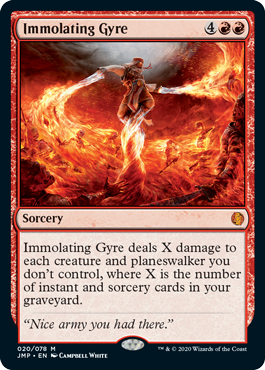
Immolating Gyre
{4}{R}{R}
Sorcery
Immolating Gyre deals X damage to each creature and planeswalker you don't control, where X is the number of instant and sorcery cards in your graveyard.
- Because Immolating Gyre is still on the stack while it's resolving, it doesn't count towards the value of X.
- In a Two-Headed Giant game, Immolating Gyre deals damage to your teammate's creatures and planeswalkers.
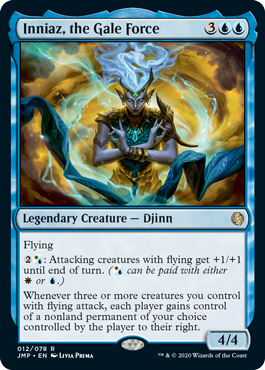
Inniaz, the Gale Force
{3}{U}{U}
Legendary Creature — Djinn
4/4
Flying
{2}{w/u}: Attacking creatures with flying get +1/+1 until end of turn. ({w/u} can be paid with either {W} or {U}.)
Whenever three or more creatures you control with flying attack, each player gains control of a nonland permanent of your choice controlled by the player to their right.
- Inniaz's ability triggers just once, no matter how many creatures with flying attack beyond the third.
- Inniaz's ability resolves even if some or all of the attacking creatures lose flying or leave combat before it resolves.
- Inniaz's ability resolves before blockers are chosen.
- You choose the permanents to be blown over to other players while Inniaz's ability is resolving. No player may take actions between the time you make the choices and the time control changes.
- If you give away a creature you control with flying that attacked, it's removed from combat. It will still be tapped if it was tapped, so it won't be able to block.
- In a two-player game, you exchange control of two permanents of your choice with your opponent.
- If any player controls no nonland permanents, the player to their left doesn't gain control of anything.
- In a Two-Headed Giant game, Inniaz's ability ignores who's on which team. The leftmost player on each team gains control of a teammate's permanent, and the rightmost player gains one from the opposing team's leftmost player. If your teammate gains control of an attacking creature this way, it's still removed from combat.
- The control-change effect of Inniaz's last ability lasts indefinitely. It doesn't wear off during the cleanup step, and it doesn't expire if Inniaz leaves the battlefield. In a multiplayer game, a player who leaves the game takes back their permanent and gives back the one they took.
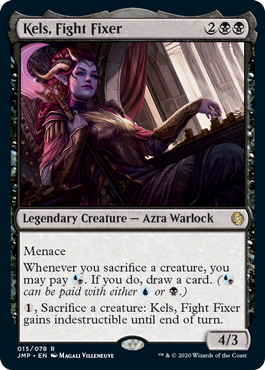
Kels, Fight Fixer
{2}{B}{B}
Legendary Creature — Azra Warlock
4/3
Menace
Whenever you sacrifice a creature, you may pay {u/b}. If you do, draw a card. ({u/b} can be paid with either {U} or {B}.)
{1}, Sacrifice a creature: Kels, Fight Fixer gains indestructible until end of turn.
- Kels's middle ability is a triggered ability, not an activated ability. It doesn't allow you to sacrifice a permanent whenever you want; rather, you need some other way of sacrificing permanents, such as Kels's last ability.
- If you sacrifice a permanent as part of a spell or activated ability's cost, Kels's middle ability will resolve before that spell or ability.
- A legendary permanent that is put into a graveyard because of the "legend rule" isn't sacrificed.
- If you sacrifice Kels, its middle ability triggers. It also triggers for any other creatures you sacrifice at the same time. You can sacrifice Kels to pay the cost of its own ability.
- While resolving Kels's middle ability, you can't pay {u/b} more than once to draw more than one card.
- You can activate Kels's last ability even if nothing's about to destroy it and even if it already has indestructible.
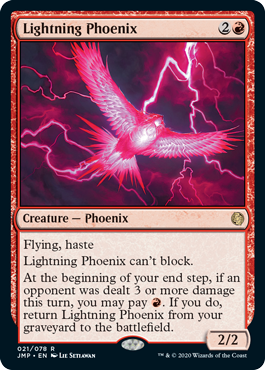
Lightning Phoenix
{2}{R}
Creature — Phoenix
2/2
Flying, haste
Lightning Phoenix can't block.
At the beginning of your end step, if an opponent was dealt 3 or more damage this turn, you may pay {R}. If you do, return Lightning Phoenix from your graveyard to the battlefield.
- Lightning Phoenix's last ability triggers only if it's in your graveyard as your end step begins and only if an opponent was dealt 3 or more damage before your end step begins.
- Lightning Phoenix's last ability looks at how much damage was dealt to opponents in the turn, even if it wasn't in your graveyard when the damage was dealt. It doesn't care if opponents gained life, even if they gained more than they were dealt damage.
- If an opponent is dealt 3 or more damage and loses the game, Lightning Phoenix's ability triggers as your end step begins.
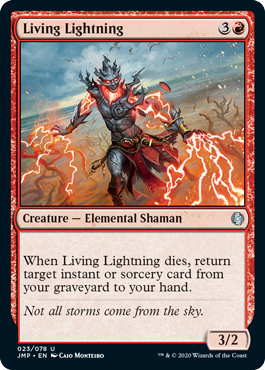
Living Lightning
{3}{R}
Creature — Elemental Shaman
3/2
When Living Lightning dies, return target instant or sorcery card from your graveyard to your hand.
- If an instant or sorcery spell you own causes Living Lightning to die, its ability can target that instant or sorcery card in your graveyard.
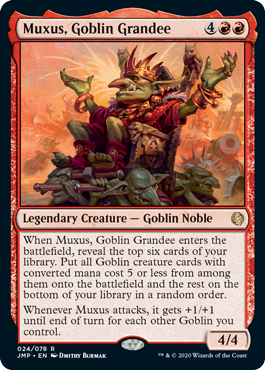
Muxus, Goblin Grandee
{4}{R}{R}
Legendary Creature — Goblin Noble
4/4
When Muxus, Goblin Grandee enters the battlefield, reveal the top six cards of your library. Put all Goblin creature cards with converted mana cost 5 or less from among them onto the battlefield and the rest on the bottom of your library in a random order.
Whenever Muxus attacks, it gets +1/+1 until end of turn for each other Goblin you control.
- If a card in a player's library has {X} in its mana cost, X is considered to be 0.
- The bonus Muxus gets is determined only as its last ability resolves. Once that happens, the bonus won't change later in the turn even if the number of Goblins you control changes.
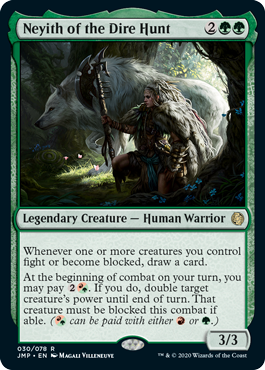
Neyith of the Dire Hunt
{2}{G}{G}
Legendary Creature — Human Warrior
3/3
Whenever one or more creatures you control fight or become blocked, draw a card.
At the beginning of combat on your turn, you may pay {2}{r/g}. If you do, double target creature's power until end of turn. That creature must be blocked this combat if able. ({r/g} can be paid with either {R} or {G}.)
- You draw just one card as Neyith's first ability resolves, no matter how many creatures you control fought or became blocked.
- A creature "fights" when an effect instructs it to fight. Dealing combat damage isn't fighting.
- While resolving Neyith's last ability, you can't pay multiple times to double a creature's power more than once or to double more than one creature's power.
- If an effect instructs you to "double" a creature's power, that creature gets +X/+0, where X is its power as that effect begins to apply. If its power is negative, instead it gets -X/-0 where X is how far below 0 its power is. The value of X won't change if another effect alters the creature's power later in the turn.
- Only one creature is required to block the target creature. Other creatures may also block it and are free to block other creatures or not block at all.
- If the target creature has menace, two creatures must block it if able.
- The defending player, not you, chooses which creature blocks the target creature.
- If each creature the defending player controls can't block for any reason (such as being tapped), then the target creature isn't blocked. If there's a cost associated with blocking the target creature, the defending player isn't forced to pay that cost, so it doesn't have to be blocked in that case either.
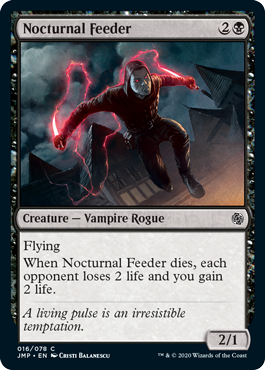
Nocturnal Feeder
{2}{B}
Creature — Vampire Rogue
2/1
Flying
When Nocturnal Feeder dies, each opponent loses 2 life and you gain 2 life.
- If your life total is brought to 0 or less at the same time that Nocturnal Feeder is dealt lethal damage, you lose the game before its ability goes on the stack.
- In a Two-Headed Giant game, Nocturnal Feeder's ability causes the opposing team to lose 4 life and you to gain 2 life.
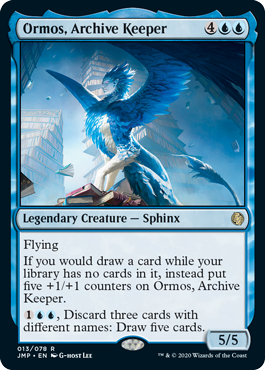
Ormos, Archive Keeper
{4}{U}{U}
Legendary Creature — Sphinx
5/5
Flying
If you would draw a card while your library has no cards in it, instead put five +1/+1 counters on Ormos, Archive Keeper.
{1}{U}{U}, Discard three cards with different names: Draw five cards.
- If a spell or ability causes you to put a card into your hand without specifically using the word "draw," it's not a card drawn.
- If you're instructed to draw more than one card and you have fewer cards in your library, you draw each card in your library, then you begin replacing draws with counters for the remaining draws.
- If two or more replacement effects would apply to a card-drawing event, the player drawing the card chooses the order in which to apply them.
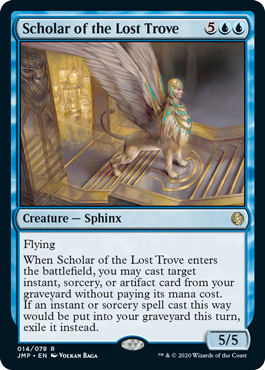
Scholar of the Lost Trove
{5}{U}{U}
Creature — Sphinx
5/5
Flying
When Scholar of the Lost Trove enters the battlefield, you may cast target instant, sorcery, or artifact card from your graveyard without paying its mana cost. If an instant or sorcery spell cast this way would be put into your graveyard this turn, exile it instead.
- If you wish to cast the target card, you must cast it while the triggered ability is resolving. You can't cast it later in the turn.
- If you cast a spell "without paying its mana cost," you can't choose to cast it for any alternative costs. You can, however, pay additional costs. If the card has any mandatory additional costs, those must be paid to cast the spell.
- If a spell has {X} in its mana cost, you must choose 0 as the value of X when casting it without paying its mana cost.
- If you cast an artifact spell this way, it won't be exiled if it would be put into your graveyard this turn.
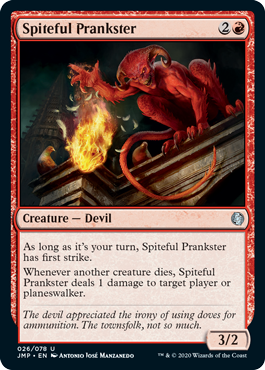
Spiteful Prankster
{2}{R}
Creature — Devil
3/2
As long as it's your turn, Spiteful Prankster has first strike.
Whenever another creature dies, Spiteful Prankster deals 1 damage to target player or planeswalker.
- If another creature dies at the same time as Spiteful Prankster, Spiteful Prankster's last ability triggers for that creature.
- If your life total is brought to 0 or less at the same time that a creature is dealt lethal damage, you lose the game before Spiteful Prankster's ability goes on the stack.
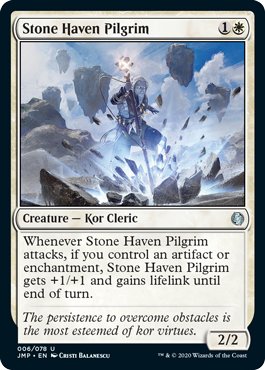
Stone Haven Pilgrim
{1}{W}
Creature — Kor Cleric
2/2
Whenever Stone Haven Pilgrim attacks, if you control an artifact or enchantment, Stone Haven Pilgrim gets +1/+1 and gains lifelink until end of turn.
- Stone Haven Pilgrim gets +1/+1 just once, no matter how many artifacts and enchantments you control. It doesn't get +2/+2 if you control an artifact and an enchantment.
- If you don't control an artifact or enchantment immediately after Stone Haven Pilgrim attacks, its ability doesn't trigger. If you don't control one as the ability resolves, it doesn't get +1/+1 or gain lifelink. It doesn't have to be the same artifact or enchantment both times, however.
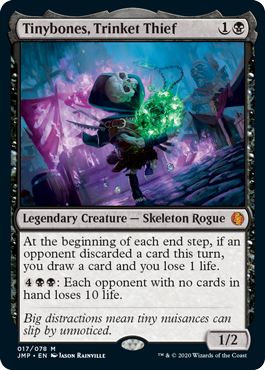
Tinybones, Trinket Thief
{1}{B}
Legendary Creature — Skeleton Rogue
1/2
At the beginning of each end step, if an opponent discarded a card this turn, you draw a card and you lose 1 life.
{4}{B}{B}: Each opponent with no cards in hand loses 10 life.
- Tinybones's first ability triggers only if an opponent has discarded a card before the end step begins. If an opponent has more cards in hand than their maximum hand size, they'll discard during their cleanup step, which is after the end step.
- Tinybones's first ability has you draw just one card and lose just 1 life, no matter how many opponents discarded cards and no matter how many cards were discarded beyond the first.
- Tinybones checks which opponents have no cards in hand only as its last ability resolves.
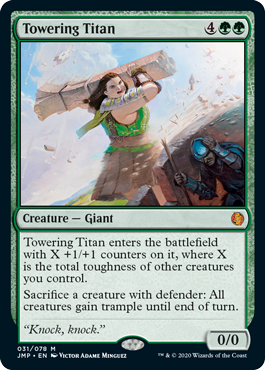
Towering Titan
{4}{G}{G}
Creature — Giant
0/0
Towering Titan enters the battlefield with X +1/+1 counters on it, where X is the total toughness of other creatures you control.
Sacrifice a creature with defender: All creatures gain trample until end of turn.
- If another creature is entering the battlefield at the same time as Towering Titan, its toughness won't contribute to the +1/+1 counters on Towering Titan.
- Once Towering Titan has entered the battlefield, it doesn't gain or lose counters as the total toughness of other creatures you control changes.
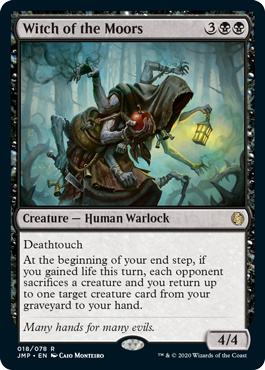
Witch of the Moors
{3}{B}{B}
Creature — Human Warlock
4/4
Deathtouch
At the beginning of your end step, if you gained life this turn, each opponent sacrifices a creature and you return up to one target creature card from your graveyard to your hand.
- The triggered ability triggers just once, no matter how much life you've gained.
- The triggered ability looks at whether you've gained life in the turn, even if Witch of the Moors wasn't on the battlefield when you gained life. It doesn't care if you also lost life, even if you lost more life than you gained.
- If you haven't gained life by the time your end step begins, the triggered ability won't trigger at all.
- You don't have to choose a target creature card at all. If you do and the target card is an illegal target by the time the ability tries to resolve, the ability won't resolve. Your opponents won't sacrifice creatures.
- As the triggered ability resolves, first the next opponent in turn order chooses a creature they control, then each other opponent in turn order does the same knowing the choices made before them. Then all the chosen creatures are sacrificed at the same time.
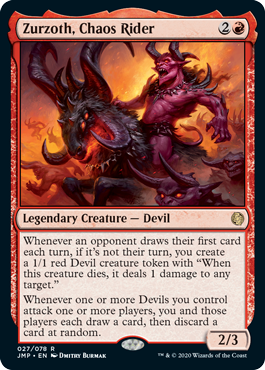
Zurzoth, Chaos Rider
{2}{R}
Legendary Creature — Devil
2/3
Whenever an opponent draws their first card each turn, if it's not their turn, you create a 1/1 red Devil creature token with "When this creature dies, it deals 1 damage to any target."
Whenever one or more Devils you control attack one or more players, you and those players each draw a card, then discard a card at random.
- If a spell or ability causes a player to put a card into their hand without specifically using the word "draw," it's not a card drawn.
- If your life total is brought to 0 or less at the same time that a Devil token is dealt lethal damage, you lose the game before its ability goes on the stack.
- Devils you control that attack a planeswalker won't cause any player to draw or discard a card.
Magic: The Gathering, Magic, Guilds of Ravnica, Ravnica Allegiance, War of the Spark, Throne of Eldraine, Theros, Ikoria, Planeswalker Decks, Antiquities, and Oracle are trademarks of Wizards of the Coast LLC in the USA and other countries. ©2020 Wizards.
